#Their narrative parallels throughout the life series...
Explore tagged Tumblr posts
Text

All companions are pansexual!!!
Game is rated M, will contain nudity. [source]
Full article:
"In a new interview with The Veilguard game director Corinne Busche, we've confirmed that yes, you will be able to romance any companion you want, regardless of your character's gender or race. It's a bit of a surprise for fans, considering that in previous Dragon Age games, the romanceable characters had different sexual orientations. Some were pansexual, sure, but others were heterosexual, others were only attracted to the same sex, and some could only be romanced if you were a certain race (Dragon Age: Inquisition's Solas, for example, could only be romanced by female elves). But Busche pushes back on the idea that The Veilguard's companions are "playersexual," a term used to describe games where NPCs are specifically only attracted to the player character. She says she's seen playersexual "done in a number of games," and "it can be really off-putting where these characters are adapting to who you, the player, are." Rather, Busche insists that they're all specifically pansexual, and that might come through in what you learn about their backstories. "Their past experiences or partners, they'll reference them and indeed who they'll become romantic with," Busche tells IGN. "For instance, we saw Harding. I might be playing a straight male character flirting with her, but I choose not to pursue a romance. She might get together with Taash. So my perception, my identity has no bearing on their identities and that comes through really strongly." When asked if that means it won't take long for romance to become an option in The Veilguard, Busche confirms that you'll be able to start flirting with everyone pretty early, as you recruit all seven companions throughout the first act. But, she clarifies, "it's not until the later parts of the game where you really commit to romance and it gets pretty spicy.""
---
"Speaking of spicy... Of course, Dragon Age: The Veilguard is a BioWare game, and games from the studio — specifically those in the Mass Effect and Dragon Age series — are known to have some fairly explicit sex scenes. Busche confirms that The Veilguard will be no different, particularly towards the end of the game: "Of course, we are an M-rated game," she says. "We do have nudity." There's also some obvious parallels to be made between The Veilguard and last year's critical darling Baldur's Gate 3. The latter became known not only for its deep romances (like The Veilguard, Baldur's Gate 3 player characters can romance any companion regardless of gender or race), but also for its sex scenes, including one involving a Wild-Shaping Druid that went pretty viral. Busche isn't afraid to admit that she has played Baldur's Gate 3, and loved it, as she's an "an RPG fan through and through": "The more character-driven party-based RPGs with deep emotional connection, the better." "What I love about the two games is I think they live side by side in a really interesting way," she continues. "They're very different games, but those emotional connections and how the narratives hook you, I think there's space for both." Specifically in regards to the sex scenes and how The Veilguard will handle theirs differently, Busche says some of Baldur's Gate 3's scenes were "shocking and comical in some ways, and I would say I loved that." "Our companions, we want them to be relatable and fully realized. So they can get spicy, but in a way that I think people will actually relate to," she says. Basically: no bear sex. Busche goes on to say that how sexually explicit the scenes are, too, will vary between characters. "Some of them are more spicy than others," she reveals. "Just like real life, our companions have such diverse personalities. Some of them are more physical, more aggressive, and some of them are more... we have a gentleman necromancer, for instance, that is more intimate and sensual." Our interview with Busche comes as BioWare continues to roll out information about the highly anticipated Dragon Age sequel, with a cinematic trailer having dropped at the Xbox Showcase over the weekend. Dragon Age: The Veilguard will debut sometime this fall."
[source]
#dragon age: the veilguard#dragon age: dreadwolf#dragon age 4#the dread wolf rises#da4#dragon age#bioware#lgbtq+#video games#solas#long post#longpost#pls remember that if you follow me you should be 18+ ^^
559 notes
·
View notes
Text
Ok so Dandadan analysis time because I've been seeing some of the old conversations about it again. So two things about Dandadan (Not the only things but two important ones):
One of the over arcing themes is bodily autonomy
This series is a romcom
Rant below the cut.
A major reason people don't like Dandadan and/or are willing to dismiss it outright is because of the SA scenes. More specifically, a lot of people believe these scenes are fanservice and have no narrative reason to be there. They do have a narrative reason to be there though. These scenes aren't supposed to be fanservice either they're intentionally supposed to be upsetting/unnerving (I won't get into how here because other people have articulated this better than I can, and they will continue to do so as long as this misconception exists).
When people think of "violations of bodily autonomy" or "violations of consent" they usually think of rape or sexual assault. It is the beginner's example to the concept, largely because everyone with common sense agrees that rape and sexual assault are bad so it's easier to point out why they're bad. This also makes it easy place to start a narrative around bodily autonomy.
The very first scene of Dandadan is of a guy trying to coerce Momo into having sex with him even though she clearly doesn't want to. The same episode/chapter directly puts this kind of behavior on par with rape and sexual assault by paralleling the time Momo kicked him to the time she kicks the rapist aliens so hard she breaks their space ship. It's very clear that the narrative's stance is that not only are rapists bad, the people who aren't legally rapists because they technically got "consent" first (through coercion) should be treated with the same level of disdain. This isn't the kind of thing that you write into a series without legitimately thinking about the dynamics of consent and bodily autonomy.
Continuing on: The series also touches on the double standard between male and female victims of sexual assault. Okarun gets laughed at for having his genitals stolen, and Seiko just does not believe Momo got abducted by aliens. This very clearly parallels how in real life people will believe male victims got assaulted, but their assault is also brushed off as not that important or something they "should've enjoyed" or a sign of weakness. Especially if the assaulter was a woman. Meanwhile female victims are usually accused of lying regardless of any evidence they provide. These two things hold constant in Seiko's reactions throughout Dandadan. She literally rides in a space ship but doesn't believe aliens are real, and even when she's helping Okarun she's usually also doing a bit at his expense.
Going even further, Dandadan also branches out into other forms of violations of bodily autonomy that aren't thought about as often. For the sake of the analysis I'm going to do bullet points regarding each character. Fair warning: There will be major spoilers here so if you haven't read the manga keep scrolling until you stop seeing bullet points.
Acro Silky: It's very easy to point out that she was a sex worker, but what I don't see is people talking about the other ways she had to sell her body to keep her and her daughter afloat. She worked in janitorial services (A lot of manual labor) and as a store clerk (A lot of standing). Individually these two jobs are not necessarily coercive, they're not great but they aren't pulling you into something you didn't know about from the start. The thing is though, none of these jobs pay enough by themselves for Acro-Silky to make a living, meaning none of them are properly compensating her for her manual labor. This is an instance of manufactured consent, while she technically agreed to take these jobs, it's clear that she wouldn't be working all of them unless she had to. This is kind of an expansion of the coercion from the guy in the first scene but on a societal level where Acro-Silky wasn't in the position to be able to say "No" and move on. As a result, her freedom is restricted. She can't spend nearly as much time with her daughter as she wants to and she can't afford to get her nice things either. To top it off, any time she did spend with her daughter she spent physically exhausted because of her work.
Mr. Shrimp: Similarly to Acro-Silky, Mr. Shrimp is forced into work he does not want to do because of limited options and the need to support his child. What sets him apart though is that he's a migrant worker and his employers physically abuse him because they can get away with it. This is an exact parallel to how migrant workers are treated in real life. He even goes to work on a farm and it's potrayed as him making an honest living to support his family which is exactly what the majority of migrant workers are trying to do. Mr. Shrimp doesn't technically "have to" work on a dairy farm now, but he chooses to enthusiastically because it's his only option that doesn't require him tk disregard his morals.
Jiji: Jiji is an example of bodily autonomy violations of minors in regards to medicine. This one is a bit more complicated so stick with me here. When the Evil Eye starts possessing Jiji, the adults around him unanimously agree it needs to be exorcised and start preparing for the ritual. When Jiji decides "Hey, actually I want to try to co-exist with him" Seiko is his only adult advocate, and even she turns around on the idea when the Evil Eye has a close call with Momo. This parallels how in real life adults will make decisions for the children in their care regardless of their wishes, and how even the adults trying to be accommodating will still go against the kids' wishes sometimes. It also does a good job of accurately capturing the nature of these disagreements too, because yeah the Evil Eye is a problem so it's understandable why all the adults want to just get rid of it even if Jiji doesn't agree. But Jiji's stance of "Yeah this will be a pain but it's one I want to deal with" is also understandable. Like, imagine instead of an exorcism we're talking about getting an amputation that would be technically helpful but isn't strictly necessary.
Vamola: One of Vamola's initial goals when she's introduced is to find a strong man and have kids with him. This isn't something she actually wants to do but is something she has been obliged to do because she is one of the few survivors of a planetary genocide. She has been marked as her people's only chance at a continued survival because the rest of her people are too old to have children. Her mother and the rest of the surviving Sumerians gave everything they had to get her off planet safely as "the last thing left on Sumer to defend" so she has unfathomable amounts of pressure and survivor's guilt to go out and have kids. She doesn't get to figure out if she wants to have kids or not, that's just something that has already been made up to her and her only choice now is with who. Luckily, the story currently has her in a position where she can have peers, a (comparatively) normal life, and she doesn't have to think of her mother's request for a while. But even if it's not the primary focus in her life right now it's still there.
Rin: At a very young age Rin was forced into the role of caretaker. With a bedridden grandmother, a deceased father, and a mother who had to work long hours to make ends meet, Rin had to learn to be independent fast. She was basically forced to, otherwise her already unstable home life would break apart even further. To make things worse, Rin knows the predicament that she's in and her mother doesn't yet. Rin's mother thinks she "got lucky having such a good kid" and doesn't realize the pressure has gotten bad enough that Rin is already giving up on her passions to take care of her grandmother to give her mother a break. Mostly because Rin knows their family doesn't really have any other options and she doesn't want to place an even larger burden on her mother by adding more grief on top of it. It's essentially the "parent running themselves ragged to support their kid" story we've seen at least twice now but from the perspective of the child.
Zuma: Similar background to Rin where his father died and he took on a caretaker kind of role for his younger brother. Except his brother dies and this absolutely breaks his mother, to the point she commits suicide and tries to take him with her. Zuma is in the position where he has lost both his caretaker and the person he took care of, and he is fully aware of why that happened. This manifests as rebellion and him forming a gang that protects kids at his school from bullying and harrassment. He's becoming a caretaker again, but this time it is an active choice he has made. He doesn't technically have to start his gang or protect anyone, he has an adult taking care of him now and if he wanted to he could spend the rest of his highschool years stepping back and being a kid again. But he doesn't, and society labels him a delinquent for stepping in when the adults who should have didn't. This is another way that Dandadan shows how minors often have their opinions dismissed by adults who believe they know better.
Much shorter less spoilery rant:
Dandadan is a romcom. I have seen too many people complain about basic romcom shenanigans as if it's bad or generic writing instead of being genre conventions. "Ugh, there's a love triangle," Yes romcoms tend to have those. "Ugh, so many girls are into Okarun," Yes, and a lot of guys are into Momo, they both get romantic rivals because it's a romcom. "They keep going back to the romance and I don't like it," It's a romcom there's going to be heavy focus on the romance, you disliking that is a genre preference not a writing issue.
Like, do people not understand the concept of blended genres? Yeah this is a Shonen battle series but it's also one that has decided to be a largely character driven romcom. This is like someone walking into a horror comedy and walking out complaining that there were jokes and the horror would be better without them. The jokes are the point and the horror is a vehicle to get there. If you don't like jokes, go find a pure horror movie to watch.
204 notes
·
View notes
Text
The Gender Narrative - from Buffy the Vampire Slayer to A24
Alright so I know this topic has probably been explored to hell and back (pun intended), but a transgender lens reading of Buffy the Vampire Slayer has beckoned me for years; and seeing I Saw the TV Glow yesterday was probably the last push I needed to get this out in writing. As we know, the film features a fictional television show heavily inspired by BTVS - and the framing highlights the same aspects I've wanted to dissect, so let's dive into it.
Spoilers under the cut!
Throughout its run, and despite its imperfections, BTVS drew much of its messaging from 90s (and early 2000s)-era feminism. Buffy's presentation as a sparkly, pink, girly girl is central to her character and her destiny. She is an icon of what girls can do and accomplish, even with the whole world against them - and, in this context, it is absolutely, startlingly captivating that her personal life revolves around a perpetual struggle for her right to girlhood.
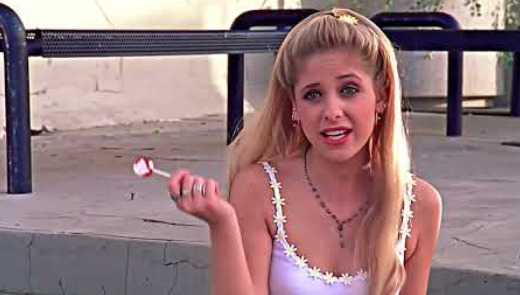
Despite being the picture-perfect blonde Valley Girl on the surface, Buffy often finds herself barred from that existence by her Slayer identity. She is consistently perceived as too strong, too capable, too aggressive, too independent, too dangerous - and, ultimately, too masculine to participate even in the most stereotypical milestones of a girl in high school. Still, that experience is what she craves the most; so she signs up for the cheer squad, she loves shopping, she runs for Prom Queen, and she goes out slaying in a halter top, with perfect bouncy curls. In essence, Buffy Summers is desperate to pass - which takes us to ISTTG and the root of its story.
The two main characters of ISTTG - "Owen" and "Maddy" - are obsessed with a popular YA series, The Pink Opaque; which, between its credits font, its girl power themes, and monster-of-the-week format, is demonstrated to be an in-universe parallel to BTVS. The Buffy equivalent - or, the pink, pretty, sensitive, and powerful Isabel - is a point of utter fascination for "Owen."
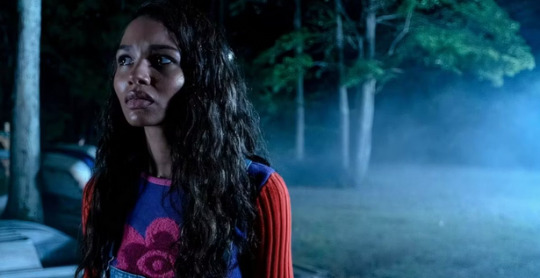
there are no good stills of her online yet please forgive me
She is everything he wants to be, everything he is meant to be; and the time he spends with "Maddy", wearing a pink dress, a pink ghost drawn on the back of his neck, the pink glow of the TV vivid on his face, is the only time he feels anything approaching to happiness or peace. The very first sequence of the film establishes that "Owen" barely responds to his own name, that his father is a walking threat of what society commands him to become, and that his mother is loving but distant. Even later on, when he apparently has a "family of [his] own", we never even see their faces. Within the context of his life, he is little more than a ghost, going through the motions; and as the story goes on, it is revealed that "Owen" is Isabel, trapped in a false reality by Mr. Melancholy, the Big Bad of TPO. Her heart was carved out, she is drugged, and buried alive; and the sound of her slowly choking to death overlays "Owen's" steadily worsening asthma.
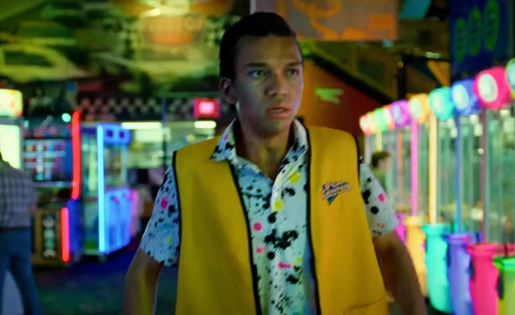
There is no denying the truth of that alternate existence by the end of the film. "Owen's" life is a nightmarish suffocation. Isabel is dying from a life of a boy she never was - in what is, explicitly, a transgender narrative.
The same story is directly mirrored by "Maddy."
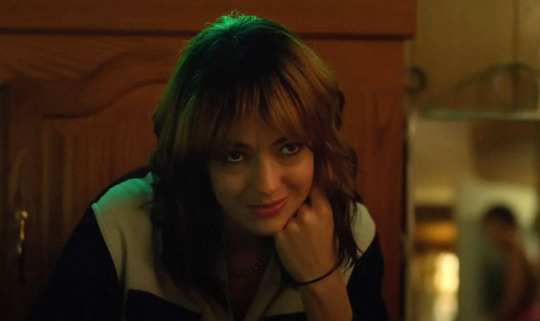
Within the premise of ISTTG, she is the similarly trapped and suffocating "Tara"; or, the second half of the Pink Opaque - who, over the course of the film, discovers the truth of their reality, returns to the world of the TV show, and then comes back, unwilling to leave Isabel behind. However, what is particularly notable is that while her character's name is, of course, an homage to Tara Maclay (made all the more obvious via Amber Benson's cameo), the "Tara" of TPO is nothing like the soft-spoken, pastel-wearing witch.
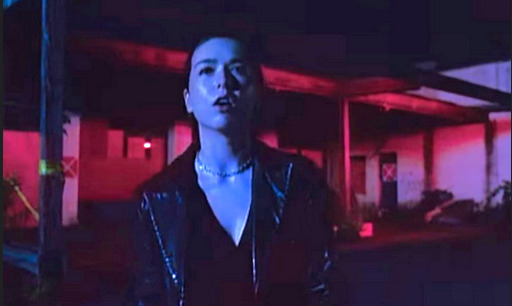
Instead, she is a bold, loud punk with slicked-back hair and a leather jacket, who snarks at the monsters-of-the-week and speaks in poetry - she's Spike; and that provides the basis for her dynamic with "Owen" throughout the film.

In the world of BTVS, Spike is largely presented as a foil to Buffy's character. He is her thematic (and extremely sexually compatible) opposite; and that extends to his own relationship with gender. His story arc is defined by his struggle to be perceived as a man; on the Watsonian level, it is an identity persistently overshadowed by his vampirism - and in the Doylist sense, his poetry, occasional eyeliner, and painted nails might have something to do with that situation. Regardless, it is a significant factor in his narrative, both before and after his original, human death - to the point where he bonds with Buffy's mother, Joyce, specifically because she "treated [him] like a man"; and in the context of ISTTG, the same themes extend directly to "Maddy." In S5:Ep7 of BTVS (Fool for Love), Spike states that "getting killed made [him] feel alive for the very first time" - and when "Maddy" returns from the world of TPO, she explains that the only way to survive what Mr. Melancholy had done to them was to bury herself alive and die in the false world. Her statement is a monologue of slam poetry, spoken without interruption and illuminated by the steady blue of a high school planetarium; and while "Owen's" experience of blue lighting is usually aggressive and abrasive, "Maddy's" is soothing. It is right. It ties directly to what she is meant to be, even as her story inevitably terrifies "Owen" - who, much like Buffy, is not yet ready to face the truth of who he is or allow himself to indulge the desires he's buried for all his life.
From what I understand, the finale of the film has proven to be divisive; some interpret it as hopeful, others as crushingly bleak - but as a BTVS fan, and a trans man myself, I cannot see it as anything other than a peak of sheer, overwhelming panic that is only experienced at the very precipice of Change. My reason for it is rooted in the parallels between the respective season 5 finales of BTVS and TPO. For Isabel and "Tara," the story ends with their apparent defeat at the hands of Mr. Melancholy; and Buffy's ends with her sacrificing herself to save the world. She dies. She is buried. And then there's season 6. As such, inevitably, "Owen" is going to accept the truth of himself; he is going to die, Isabel is going to claw her way out of a grave - and when she does, only one person is going to understand what happened.
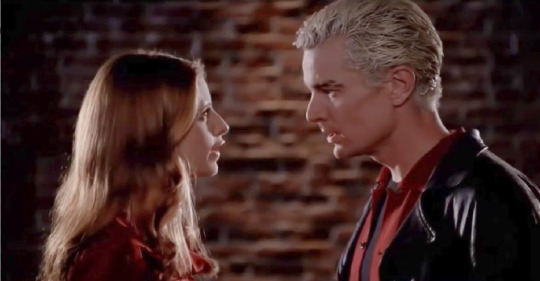
In conclusion - they are T4T. To me. And to Jane Schoenbrun, I suppose.
#i saw the tv glow#buffy the vampire slayer#isttg#i saw the tv glow spoilers#i saw the tv glow analysis#btvs#spuffy#spike btvs#william the bloody#buffy summers#film analysis#jane schoenbrun#a24#a24 films#a24 movies#btvs spike#btvs rewatch#queer film#queer lens
244 notes
·
View notes
Text
Will Stolas lose his immortality?

I’ve seen several mentions of Mission: Weeaboo-boo being a parallel to Blitz’s first encounter with Stolas (as an adult), which I can totally get behind. Right out the gate we have the “you were here to ravish me” similarity as well as Blitz “sneaking in, under the cover of night.”


I've also seen the hypothesis that Emberlynn's fan fiction includes an element of foreshadowing for what’s going to happen in the climax of Season 2.
Her episode is also the only one of the shorts with that "ticking" sound during the content warning, which lends further credence to the idea that it is tied in with the main plot somehow, even if merely thematically.
This got me pondering the possible parallels related to Emberlynn's functional immortality against demonkind and her decision to give it up in order to "be with Blitz."

Which now has me wondering—is Stolas going to have to give up his immortality to be with Blitz? Or lose it due to the illegal arrangement they've had going on?
Or, leaning into the idea that her episode is merely a reflection of how Blitz views his relationship with Stolas, could it simply be a parallel to the fact that Stolas has already been in mortal danger as a result of choosing to be with Blitz? And that Blitz feels responsible for Stolas' “undoing?”


We’re shown in Ghostfuckers that one of Blitz’s fears is that Millie could have died during any of the missions from episodes 1-4 of season one. Couple that with the fact that he believes that he “makes everyone’s lives worse,” it’s reasonable to assume that he not only fears, but feels responsible for her life being in mortal danger during their missions.
Whether he cared more about Stolas or the arrangement when he stopped the first assassination attempt, Striker was without the angelic weapon when he fled, which Moxxie had expressed complete shock in Striker's ability to have in the first place.
I think that Blitz allowed his cognitive dissonance to convince himself that Striker was no longer a threat without this weapon. Because deep down, he may have been afraid that telling Stolas about the assassination attempt might not be a neutral event for him. That he didn’t even want to contemplate the idea that he might actually care beyond the loss of their "arrangement."
In the very next episode, Truth Seekers, we see these feelings forced to the surface during his drug-induced hallucination—with Stolas at the top of a long flight of stairs, saying, “Are you afraid to love people, Blitzy?”

With the knowledge that he’s afraid that he makes “everyone’s lives worse,” it adds layers to many Stolitz scenes that follow throughout the series. Data points that someone like Blitz could easily see as evidence of that very fear. “Proof” that he’s responsible for Stolas’ life “falling apart.”
- He knew that Stolas was married as evidenced by his “Sorry, I fucked your husband” after their first night together. Stolas was clearly not only consenting to sex with Blitz, but was expressing a joyous desperation for it. Despite this, it was actually the “first ever friend” comment that caused Blitz to hesitate and return to Stolas, which we now know was a soft spot for him due to his experience with Fizz. But it was Blitz’s choice to stay or go, and staying is what kicked off the arrangement, is the reason for the sexual nature of its terms, and caused a domino effect that impacted Stolas’ entire life, including his family.

- When the two of them were being roasted at Ozzie’s, it wasn’t Stolas’ perspective that was showcased for Blitz, but Ozzie and Wally Wackford’s. Not only does the narrative begin early with Wally’s “Are you sleeping with an imp?!” but it’s followed up by Ozzie’s “My dark lord, how the mighty do fall,” and continues with Stolas being called out for “giving up” his wife and daughter specifically for his choice to be with Blitz. And the way that the narrative plays out, it almost sounds like his downfall was less for cheating than it was for sleeping with an imp.
Either way, seeing Stolas hide his face behind the menu likely “confirmed” multiple things for Blitz. That despite Stolas’ “public” flirting in front of other imps, when confronted by someone actually associated with Stolas’ upper class society, Blitz was reduced to being an embarrassment for Stolas.
Believing that, left no room for even a glimmer of hope that they could be anything more than what they already were: a prince who enjoyed “sleeping with an imp” and was apparently paying a pretty steep price for it.






- Then there’s Octavia. In Loo Loo Land, Stolas takes her to the theme park but spends most of his time flirting with Blitz. Not only does she comment on this in front of Blitz, but he’s there to witness when she’s finally had enough and storms off, mad at her father. In Seeing Stars, Octavia came to I.M.P., stole the grimoire, and disappeared with it. Why? Because her father was so wrapped up in the divorce, that she felt angry and neglected.

- In Full Moon, his fight with Stolas took them through part of the palace. This is very likely the first time he’s seen it since he was apprehended at the “Not Divorced” party, and what has it become? When he came back into Stolas’ life, it was bright, vibrant, and full of people. That night in Full Moon, it was dark, muted, and the only person visible in his photos were of Via.






While Blitz may have inferred at the time that Stolas’ marriage wasn’t in a good place, he doesn’t know just how miserable Stolas was in the life he had before. From Blitz’s perspective, he may have appeared fairly content overall when they first reconnected.

Compare that to Apology Tour, which Blitz sees as the natural outcome of what people experience when they are around him long enough.

Data point after data point, to feed into the idea that Stolas’ life has been “ruined,” just by Blitz being in it. His marriage ended, his relationship with his daughter was negatively impacted, and by Ghostfuckers, someone had tried to kill him twice.
I don't think Blitz is aware that Stella is the one who has been putting out the hits, but I could see him internalizing the idea that if Stolas had died during the second attempt, it would have been his fault. Because not only had he chosen not to warn Stolas that someone was trying to assassinate him, he was also the person that Stolas had reached out to for help and he had let M&M go in his stead.
It is after this attempt on Stolas’ life that we see Blitz absolutely shook by the idea that Stolas not only could be hurt, but that he was hurt and had almost died.

This is also several months after the night at Ozzie’s, when he had first begun to realize that, painful as it was, he may care for Stolas after all. Months during which they hadn’t seen each other and he had time to actually miss their time together.
Between that and finding out that he can actually get hurt, I can see Stolas becoming one of the people that Blitz feels the desire to protect. Unfortunately, this also seems to come with the anxiety of being responsible for what he perceives as the “collateral damage” of being associated with him.
Finally, in Truth Seekers, where the "ticking" began, Stolas had exposed himself via "real" demonic power to the D.H.O.R.K.S. and by extension, the living world. But the only reason he was there and got himself caught on camera is because he came to rescue Blitz.

This could be linked to the scene where we see Blitz attempting to protect and defend Stolas against someone. My bet is on Paimon, who, while ranking below the 7 Sins in power, is still depicted as a fairly powerful being. Stolas had not only exposed their existence to the living world, but had showcased his power in his attempt to scare the agents into submission. We know there’s going to be consequences for that, as well as for the divorce, and I expect Paimon will have a part to play, one way or another.




Stolas mentioned in Seeing Stars that without the grimoire, his powers are rather limited. I assumed that the worst outcome for him at the end of Season 2 was being stripped of his status and grimoire, which would vastly reduce his raw power as well as the power his position in society affords him.
Obviously, the actual worst-case scenario would be the loss of his life, which it's assumed Blitz is trying to protect him from in the snippet from the trailer. But it didn't occur to me until now that even with my own certainty that he'll survive the Season 2 climax, there was a third possible outcome... that along with his power and status, Stolas could also be stripped of his immortality.
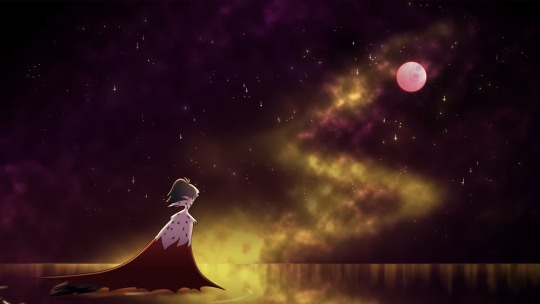
#helluva boss#helluva boss analysis#helluva theory#helluva detail#stolitz#blitz#blitzo#blitzø#stolas#ghostfuckers#apology tour#full moon#mission weeaboo boo#helluva boss shorts#onehelluvafan
109 notes
·
View notes
Text
another theme between spop and gravity falls that i want to point out is one of the characters being shelved for most of the series, and revealed to be alive towards the end. Micah and Ford.
only difference being:
1. Foreshadowing
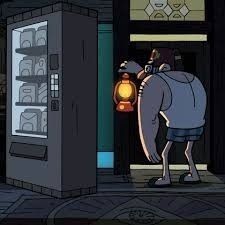
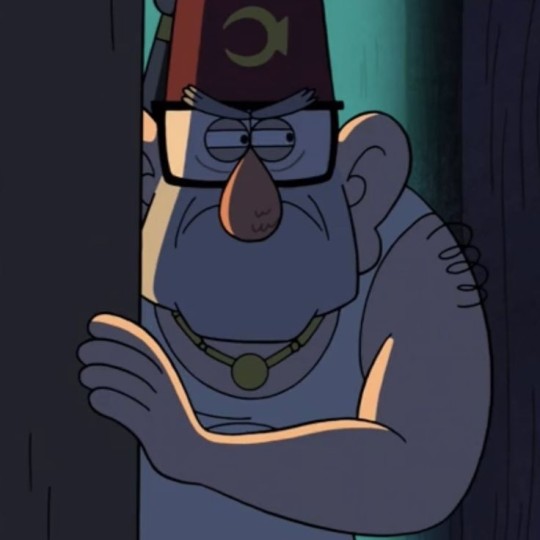
from the first episode, we see that Stan has some sort of a secret and that he's working towards something.
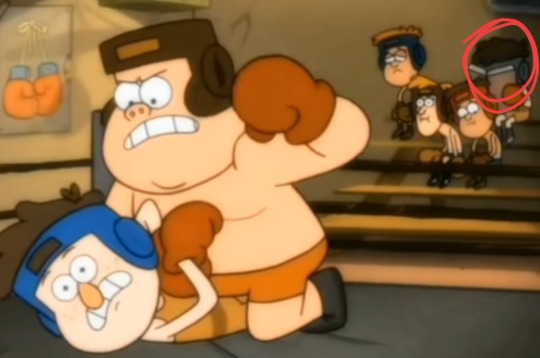
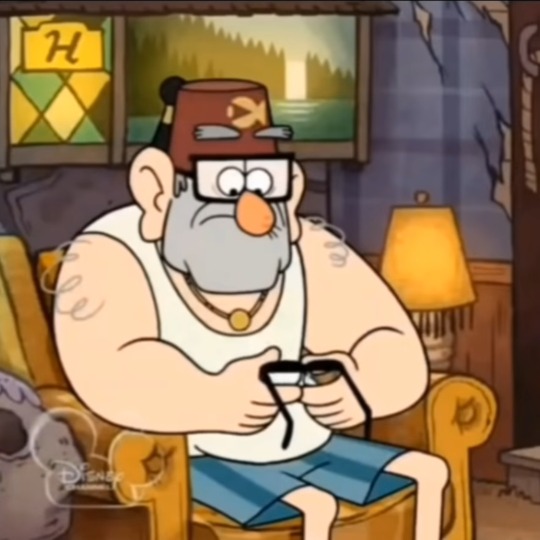
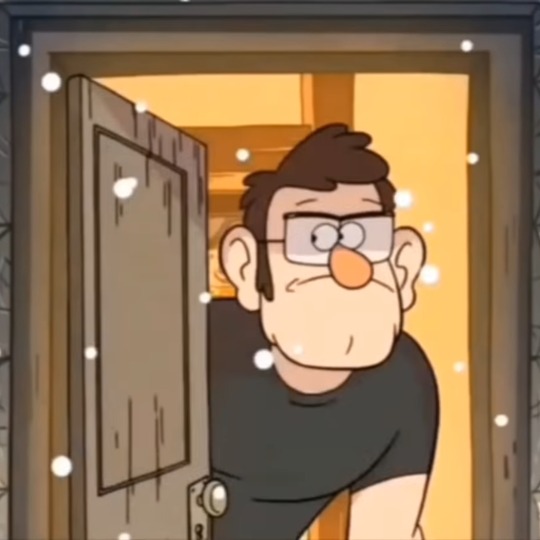
and throughout the series, we get hints that indicate the existence of a twin brother, one episode even straight up SHOWS Ford (but viewers were led to believe it was Stan).
Micah, on the other hand? the only scene that could be proof of him being alive is during the fake reality in s3 finale.
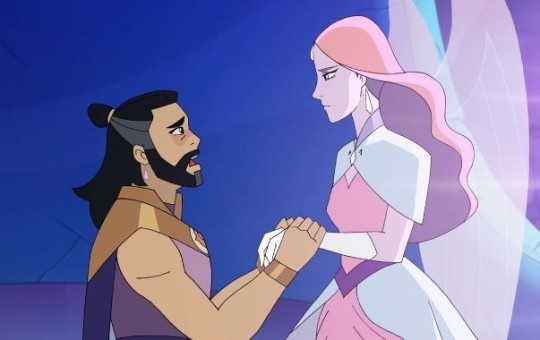
Micah: Angie, Angella wait! I'm not-
people assume that Micah was trying to tell Angella that he's not dead, but we have no way of knowing for sure. it could have been anything.
so basically, there's no foreshadowing that Micah was alive and i'm pretty darn sure that the writers only wrote him in so that the viewers would forget about Catra killing Angella. Glimmer just needs one of her parents, it's not important which one.
but that's just before. what about after? do these characters have any importance after they are finally revealed to be alive?
2. Plot Relevance

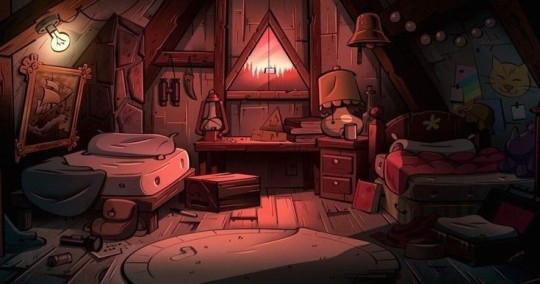
even before the big reveal, Ford was a very important part of the plot. he was the mysterious author of the journals, he was the missing puzzle piece in Stan's life, his connection with Bill was clearly seen in the structure of Mystery Shack.
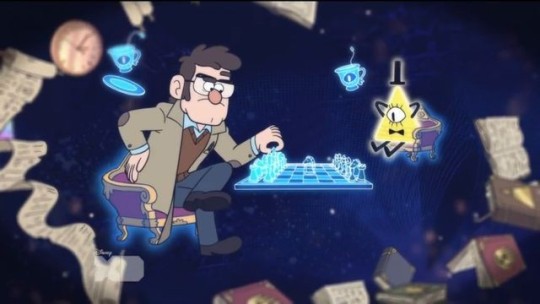
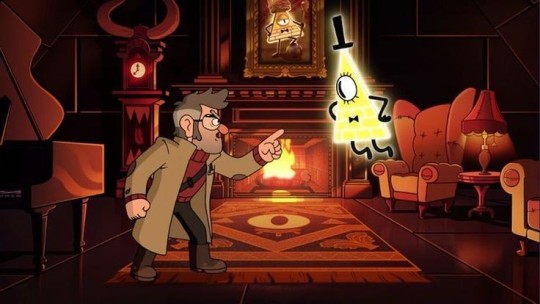
and after he emerges from the rift, he is even more relevant to the plot. especially because of his history with Bill and his knowledge about the supernatural. even though Stan is the one who defeats Bill in the end, it could not have been done without Ford.
not to mention, his relationship with Stan is essential to the plot. they are a direct parallel to Mabel and Dipper, and the entire series is about familial relationships.
the show just wouldn't be the same without Ford, because he was always one of the main characters, even before he was officially introduced as a character.
and how about Micah? he literally plays no role in the narrative after he is introduced.
one similarity between Ford and Micah is that they were both stranded in an unfamiliar place for years, with no connection to humanity.
but the difference is that while this is used for comedic purposes with Ford, it is also given enough emotional importance, especially when it came to his trust issues and his relationship with Stan.
whereas with Micah, it is solely used for comedic purposes and we never see how being forced to survive on a deserted deadly island has affected Micah's psyche or his relationship with people.
coming back to my point, Micah doesn't even seem all that bothered after learning that Angella is dead. he is shocked and sad for a moment, and then that is completely forgotten.
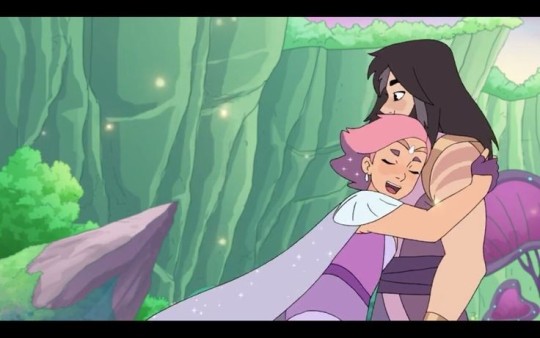
reconnecting with Glimmer? everything is settled with just one generic emotional speech and a hug.
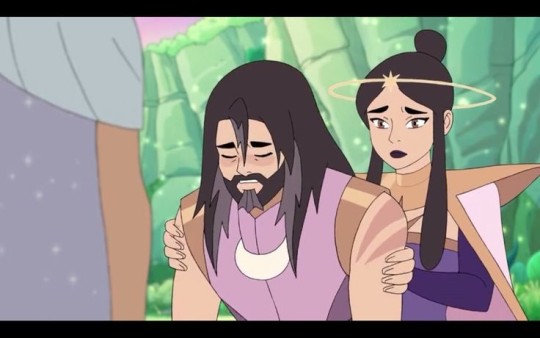
reconnecting with his sister, Castaspella? barely touched upon.
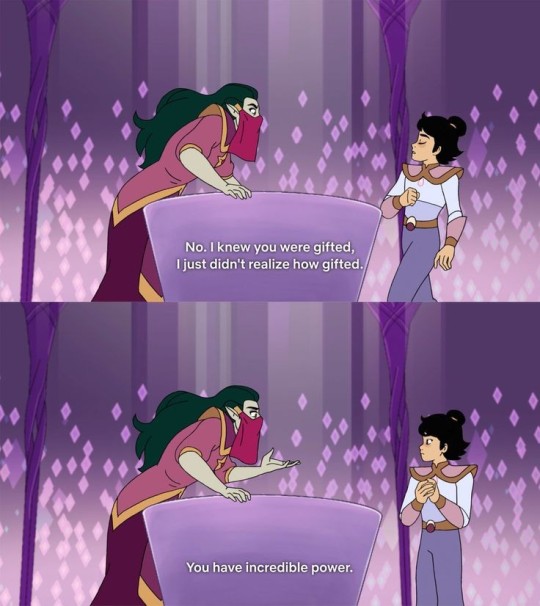
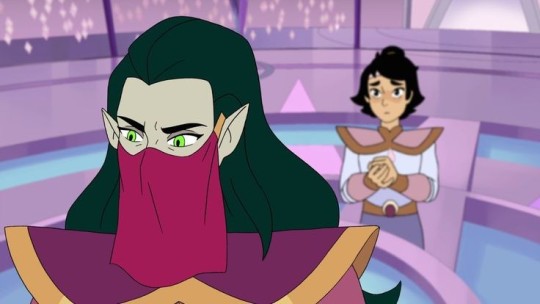
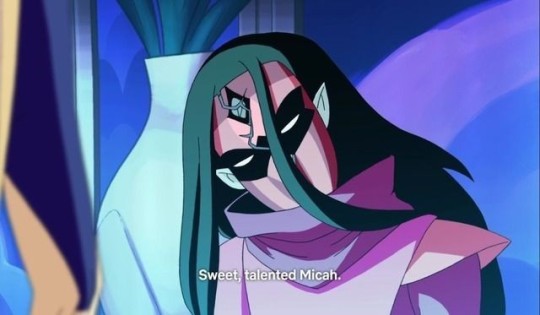
like Ford, Micah had history with a master manipulator - Shadow Weaver. they could have expanded on this, shown us how Shadow Weaver's treatment of Micah had an impact on him.
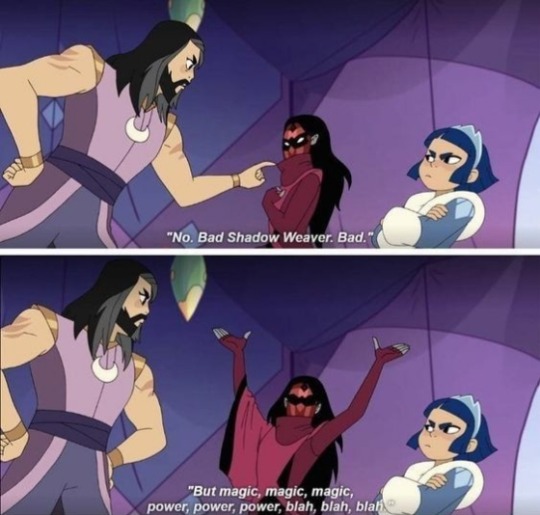
but no, apart from him being all "you can't trust Shadow Weaver!" he provides no new insight. if anything, he just got in the way of Shadow Weaver trying to do something good for once.
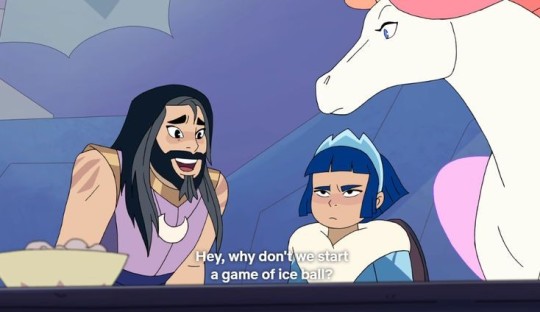
other than that, he's just a silly goofy dad who wants to bond with his daughter. that's it. he has absolutely no relevance to the plot other than making a fool out of himself, and kind of forming a connection with Frosta.
we're supposed to believe that Micah was this powerful sorcerer and the king of Brightmoon, when even the writers don't give him the respect that he deserves.
newsflash: you can make a character funny and important to the plot. Ford had his fair share of comedic bits, but that didn't take away from his emotional moments and his role in the narrative.
#spop critical#spop salt#spop#spop discourse#spop criticism#she ra#anti spop#king micah#gravity falls#stanford pines#ford pines#writing critique#media critique
110 notes
·
View notes
Text
Wait can I be crazy for a second. I'm rewatching Severance season one and it's actually crazyyyyyy that Mark was a professor of WWI history specifically because that war is when "shellshock" (which would become our modern understanding of "trauma") first got talked about ("From shell shock to PTSD..."), which directly ties into how we developed modern conceptions of the self, memory, and narrative acts of reintegration.
Fritz Breithaupt argues that our modern understanding of trauma was influenced by 1800s German romanticism. Just prior to this period in German literature, around 1770, the idea of "a sense of self" or "selfhood" was taking hold in the West. In German romanticism, trauma became a potential site for the development of that sense of self. Breithaupt argues that German romanticism began to take seriously "the acknowledgement that memory is subject to literary fictionalization" (Breithaupt, emphasis mine). German romantic novels began to acknowledge and play with the idea that our memories are imperfect and that retelling them may lead to new revelations about events in our past (Breithaupt).
Some of these German romantic novels began to deal specifically with "wounds." In these novels, "wounding events" initially shatter our sense of self, but they are also potent sites of potential transformation. Retellings and potentially even relivings of the wounds, in these stories, allowed for shifts in agency. For example, one might go from seeing themself as a passive victim in the initial wounding event to understanding, in the retelling, where they had agency even when they were wounded; this might then let them see where they have more agency in the present moment as well.
Obviously, our modern understanding of trauma has shifted a lot from our proto-conception of it in 1800s Germany. (For example, we now know that there are ways in which people who have been through trauma might seek to relive the trauma in a way that attempts to reclaim agency but actually further harms them) (Neimeyer). However, to this day, "narrative models" remain one form of therapeutic intervention offered for trauma. There are different forms of it, but the core of these interventions is often that certain forms of retelling the event can help reintegrate the traumatic event into a person's sense of self or life narrative and therefore lead to healthy growth (Levy).
So tying that back to Severance, we obviously see Severance playing with similar themes around questions of self, trauma, and memory. The severance process can be interpreted as inherently traumatic: it shatters a person's sense of self and robs them of their agency. It's the dehumanization demanded under a capitalist system, taken to an extreme. As the series continues, we also see explorations of further violations of innie's free will and bodily autonomy that can happen, such as Helena's rape-by-deception of Mark S. (which also uses Helly's body against her will) and the pretty literal torture Gemma is undergoing.
In Helly's case, this trauma was explicitly sexual, while Gemma's has undertones of sexual assault as well (as we see a man who clearly wants to exploit his power over her for some sort of "romantic" ends at least stripping her of bodily autonomy). In both these cases, they are left dealing with the physical and emotional aftermaths of events they can't remember, which is unfortunately an experience that many people who have been through sexual assault and rape will resonate with. We also see narrative themes of child abuse running throughout the show--explicitly in the paralleling of Harmony's past as an exploited child laborer with Miss Huang's current position at Lumon, and implicitly in the way even the adult innies are treated like children by their unsevered supervisors who dismiss their autonomy and claim to know what's best for them.
And while Lumon would not necessarily admit that most of the above had happened to its employees or that the severance process itself is, in some ways, inherently traumatic, they do seem to be developing this technology to help people avoid not just traumatic but even just uncomfortable/painful parts of life. Severance is not just critiquing the dehumanization that capitalism asks of us in order for us to do our jobs; it's also critiquing the way it then tries to sell us products that can cut us off from parts of ourself and our experiences, that placate or numb pain. There's a danger in following too far the German romantic understanding of trauma as a potential site of creation for the self--in my view, trauma does not have inherent meaning or make us stronger, and thinking that it does could lead us down a path of excusing it or even finding it necessary for some people to endure. However, trauma is something many of us have experienced in one form or another, and--as narrative interventions for trauma can help us see--there is a way to integrate it into the larger meaning of our lives that ultimately lets us move forward more healthily than if we attempt to cut ourselves off forever from the part of ourselves that endured pain.
We haven't yet seen what successful reintegration looks like, yet, in the show (although I suspect we might, sometime in the next few episodes). I also suspect it won't come without a price. But I'm interested to see how Severance continues to develop its themes in conversation with the history of trauma. What stories do we tell ourselves about our own memories and our sense of self? Who else shapes or tries to shape these stories? What is the price of cutting off part of ourselves to try to live without pain? What is the price of living with pain to try to live with more wholeness? Which price would we rather pay? How do we continue to make meaning and build enduring relationships after that initial shattering of identity and our attempted repair? I think we'll start to see Severance's answers as this season comes to a close.
Works Cited
Breithaupt, Fritz. “The Invention of Trauma in German Romanticism.” Critical Inquiry, vol. 32, no. 1 (2005): 77–101. https://www.jstor.org/stable/10.1086/498005
"From shell-shock to PTSD, a century of invisible war trauma." PBS News, Nov 11, 2018. https://www.pbs.org/newshour/nation/from-shell-shock-to-ptsd-a-century-of-invisible-war-trauma.
Levy, Michael S. "A Helpful Way to Conceptualize and Understand Reenactments." The Journal of Psychotherapy Practice and Research, vol. 7 (1998): 227–235. https://pmc.ncbi.nlm.nih.gov/articles/PMC3330499/
Neimeyer, Robert A. “Fostering Posttraumatic Growth: A Narrative Elaboration.” Psychological Inquiry 15, no. 1 (2004): 53–59. http://www.jstor.org/stable/20447202.
#wheeeeeeee#severance#girls will write entire essays on severance instead of writing the actual grad school essays they are supposed to because#they are 'sick' and 'have a cold' and 'can't concentrate'#also sorry i think it's so funny putting a works cited in a tumblr post. and also i did want to give credit to my sources but i thought thi#was the funnest way possible not just putting in an x with a link
30 notes
·
View notes
Text
Parallels between Voldemort and Harry’s parents
Throughout the book series, Voldemort mirrors Harry. However, their parents’ relationships mirror each other too. I’ll be taking evidence from OoTP and HBP to draw out the parallels I've observed between Tom Riddle Snr/Merope Gaunt and James Potter/Lily Evans.
A small thank you to @pangaeaseas for discussing this with me <3
The “impossiblity”
“And they ended up married?” Harry said in disbelief, unable to imagine two people less likely to fall in love.
Upon viewing Bob Ogden’s memory in chapter ten of HBP, Harry conceives the notion of Tom Riddle Senior and Merope Gaunt coming together as highly impossible.
She had clearly loathed James and Harry simply could not understand how they could have ended up married. Once or twice he even wondered whether James had forced her into it. . . .
This is Harry’s reaction in chapter 29 of OoTP, after viewing Lily and James in Snape’s memory. Both are Harry's instantaneous impressions of their dynamic. In both cases, their coming together is stated to be as unlikely as possible.
2. One wants the other’s attention; the other doesn’t give it James’s free hand jumped to his hair again. […] “All right, Evans?” said James, and the tone of his voice was suddenly pleasant, deeper, more mature. […] “I’m surprised your broomstick can get off the ground with that fat head on it. You make me SICK.”
“Good lord, you’re right!” said [Tom Riddle's] voice. “That’ll be the son, I told you he’s not right in the head. Don’t look at it, Cecilia, darling.” “Always in the garden when he passes, peering through the hedge at him, isn’t [Merope]? And last night —”
Here, the narrative speaks for itself. The dynamics are clear; there’s one who is seeking the other’s attention, but the other greatly dislikes them, or any association with them, and wants to get away as soon as possible.
3. Popularity, social class differences and blood status 3.1 - Popularity
“You can imagine the gossip it caused when the squire’s son ran off with the tramp’s daughter, Merope.” “Look, Harry, what you’ve got to understand is that your father and Sirius were the best in the school at whatever they did — everyone thought they were the height of cool — if they sometimes got a bit carried away —”
Both male characters are quite popular and paid close attention to by the people around them.
3.2 - Blood status One comes from an old, Pureblood family - Merope, James The other comes from the Muggle world - Lily, Tom Sr
3.3 - Social differences There’s a distinct divide of wealth between Merope and Tom Sr apparent to anyone at first glance, and even stated by Tom. The Gaunts are considered as “tramps” by the Riddles and all of Little Hangleton. The Riddles are incredibly well-off, owning a manor, substantious amount of land, and a horse, indicating prosperity that contrasts against Merope's struggling life.
James comes from an old, wealthy family, contrasting against Lily’s midlands lower-middle class background.
4. First glimpse I won’t be considering photographs and the Mirror of Erised as first glimpses of Jily here.
Both relationships, before coming to fruit, are viewed by Harry through memories. Then, he is given an interpretation and/or an explanation by someone with a clearly biased view, whether it be positive or negative.
4.1 Dumbledore’s opinion, critical of Merope -
“Personally, I am inclined to think that she used a love potion. I am sure it would have seemed more romantic to her, and I do not think it would have been very difficult, some hot day, when Riddle was riding alone, to persuade him to take a drink of water.”
4.2 Sirius and Remus - Being James’ best friends, and more involved in the scene Harry had witnessed, they have a forgiving opinion of James… However, the clarity that Harry seeks for regarding whether Snape’s accusations against James were false or not is not completely received and by the end of the discussion, we see:
Sirius frowned at Harry, who was still looking unconvinced.
However, James is also favoured by the narrative. In the following sequence, Sirius advocates for him,
“Look,” he said, “your father was the best friend I ever had, and he was a good person. A lot of people are idiots at the age of fifteen. He grew out of it.”
There’s no one to defend Merope. Her ugliness and desperate poverty makes her out into such a woman that only a man who is love-potioned or under the Imperius Curse could marry her. Any other notion is unthinkable.
I’m not suggesting that she absolutely didn’t love potion Tom Snr. Or that Dumbledore is way off the mark in his guesswork. He has evidence in the form of rumours circulated by the villagers of Little Hangleton. (Going on an aside here, but HBP is a book that focuses on the rumours circulating about Harry, his discomfort around it and its distance from the truth. I have to wonder why Dumbledore gives the rumours such substance while basing his theories of Voldemort's parents.)
Right off the bat, he doesn’t consider the idea that there may have been some “likeable/attractive” trait within her to catch Tom's attention, or a positive development in her character away from her family, like James “growing out of it”. He immediately tells Harry, “I think you are forgetting that Merope was a witch.”
5. Marrying young & conceiving early Lily and James die at twenty one, marrying very soon after Hogwarts, and expecting Harry at nineteen. Merope dies aged nineteen.
6. A love triangle Morfin taunts Merope with Cecilia, the Muggle woman who is seen with Tom Riddle Sr as they pass by the Gaunt’s house. Considering that Tom calls her “darling”, she is, most likely, someone he likes in a romantic sense.
From Deathly Hallows, we learn that Snape loved Lily and turns spy for her. A spark of his jealousy is observed in chapter 33 of the Deathly Hallows -
The moment she had insulted James Potter, his whole body had relaxed, and as they walked away there was a new spring in Snape’s step…
Of course, this is where the similarities end. Divergences like Tom Riddle Snr leaving Merope and her losing the will to live, create a bitter ending to Voldemort's parents' story, as compared to the ‘happy ending’ James and Lily lived for a few years before getting killed.
The differences between the two relationships lie in James' story reflecting personal growth and development in the relatively accepting environment of Hogwarts. While Merope, who has been denied and abused all her life in Little Hangleton's isolated village, finally gets the chance to exert her control and power on the life she can now lead by her own.
A difference in morals, setting, family background and the means they use to pursue their relationships contrast their stories.
#harry potter#tom riddle#tom riddle sr#merope gaunt#lily evans#james potter#james x lily#merope x tom#hp meta
48 notes
·
View notes
Text
🥧🍻Contains spoilers for Supernatural ending🍻🥧
I take what I said about the ending back. I've been rewatching and I agree that it wasn't right.
Throughout the entire series, we consistently see Sam and Dean encounter other hunters who usually represent two paths. In this life, you die or go insane ("You either die a hero or you live long enough to become a villain" -The Dark Knight). And of the two options, Sam and Dean seem to have decided that dying is at least better than potentially hurting someone. Neither of them actually believe that because they keep bringing each other back.
But this post is mostly about Dean's ending - death, in the line of duty, by rusty rebar.
During my first watchthrough, I could see - very surface level - that yeah, sure, Dean would want to die that way. Going out saving people, Sammy at his side.
But almost every other time (if not every time) Dean is faced with his own death, he decides he doesn't actually want that. He feels he must. He dies so others can live, that's his job, it's expected. But he would live if he could. When he made the demon deal to get Sam back, he confronts his nightmare self and says he doesn't want to die. He doesn't deserve to die. With the mark of Cain, in the confession booth he tells the priest that he knows he doesn't want to die and that he wants to live and experience life differently.
Dean wants to break away from the expectation that hunters die. Maybe he can't have a "normal" life. But he wants something other than what's expected of him. What God expected of him.
This was supposed to be Team Free Will. This was supposed to be about breaking away from God's Plan. Not dying like the little soldier daddy raised him to be but to become more than that. Break away from the narrative.
In the end, though, Dean is forced to have the death that everyone else planned for him. The self-sacrificing version of himself, other hunters, his dad, God. All the people we as the audience wanted Dean to be free of, to live in spite of - he dies like daddy's blunt little instrument. Cas sacrificed himself to the empty, finding peace in the face of never seeing the love of his existence again, in the face of literal eternal nothingness so that Dean could live and be more than [Dean] thought he could be. He was happy to sacrifice his happiness for Dean's. Just for Dean's life to be cut short the same way Cas died to avoid. (Death because of the work. Death like a soldier in battle.)
All of the times Dean and Sam (and Cas) die and come back to life, all of the people they find who live happily, the family they find together, the love they find, defeating literal God - it all felt like it was building to something more substantial. That they BOTH (*) were going to get something more than they expected - or, rather, resigned themselves to.
And on Sam's end - throughout the show, they show us, surface level and parallel to deans death, that him living a "normal" life without dean is what is expected. He left the life. He left Dad and Dean, went to college, had goals and aspirations, and had a serious girlfriend. His life was laid out for him. Just like death was laid out for Dean. But when push comes to shove, Sam doesn't want to live without Dean. Even when Sam thinks he can do it, like when Dean goes to purgatory, he comes the moment Dean calls and gets back into the life. When Dean dies from the mark, he says so. He was wrong, and he'll do anything to get Dean back. Everybody asks him why he would ever come back when was almost out and he tells them that he actually loves this life. That now he isn't forced into it but chooses it. He doesn't want a life without his brother in it. And that is what he was doomed to suffer. By the end of the series, I don't think Sam would have just let go like that.
Chuck said one brother had to kill the other. In other words, one lives, one dies. And that's what happened.
*I wasnt going to but now I am. Let's talk about Cas too! Through the show Cas dies again and again and again. God hates the disobedient angel with a crack in his chassis who fell in love with a man. God kills him. God wants him out of the picture but he won't go. He can't go. The story falls apart without him in it. Dean falls apart without him. But somehow his death is considered a good ending for him (good story telling wise, externally)? That confessing his love was enough? That dying in place of Dean was where he wanted to be? Sure, he was happy but it came at the price of that very happiness. It was had and taken in a moment. He was destined to die by God and that's what happened. (And we are supposed to believe that Dean just... lives on, cuddlin his dog and eatin' pie like he's not wrecked? That every other time Cas dies he falls apart but this time when Cas dies, they defeat God and true happiness is supposedly possible now - Dean would just give up? That he wouldn't try to get him back? Especially after a love confession? That just doesn't make sense to me.
My theory is that there's more to the ending than we know. That they did intentionally wrap it up there, that you can take it or leave it. But it leaves you wanting, leaves just enough questions unanswered that if they were to do a revival there's things they can do with the story.
Tl:dr: for a show about breaking away from the narrative, choosing free will, and not being held back by expectations, the ending really didn't fit well and let us down. IN MY PERSONAL OPINION
#lou watches supernatural#this post got away from me#supernatural#spn#chuck won#chuck won theory#i know im not the first to say this surely but ive never said it myself#dean winchester#sam winchester#dean deserved better#team free will#tfw#spn spoilers#supernatural spoilers#lou rants#lou's original posts#castiel#castiel deserved better#cas deserved better#supernatural meta
52 notes
·
View notes
Text
In a week or so it'll be the 3 year anniversary that FINAL was released outside of Japan. I still remember the watch party I went to and how we all wowed at parts online. How we were--as a collective-- weirded out by the CGI Rei sequence. Which will always be one of the film's highlights for me. How striking the divine geometries were.
The Kaworu and Gendo parallels despite them being on opposite ends of the communicative spectrum.
How the former uses music as a means of communication and the latter uses music as a replacement for people. How Kaworu's distance from people didn't stop him from trying to communicate and how Gendo's relationship with people was used to justify his distance. How Shinji's 'You're like my father' is subverted in intention this time around. The OG series variation is uttered when Shinji finds out Kaworu is an angel, is forced to realize his desire to destroy angels comes from false, honeyed words and recoils from this revelation by likening Kaworu to his father. The latter comes from when Shinji finally understands the both of them, how music makes them happy for different reasons.
I still remember giving my thoughts on the movie to others. How my inbox was not too long after inundated. I didn't feel like an authority figure, but rather someone putting their thoughts down on a moving metatextual film. I guess it resonated with a lot of people.
I still remember how FINAL recontextualized certain things. How it addressed personal grievances of mine in why Rebuild Eva seemed 'tame' compared to Eva. How the horrors feel more implicit and seemingly less unsettling. The horror of Rebuild Eva's predecessor isn't just the contempt of man, but how this manifests and how often this type of injustice goes unanswered. How life tells you that all your enemies, your adversaries will eventually suffer comeuppances. But this is hardly the case. It just keeps happening. You will often loudly weep to a world that willingly cuts off its ears.
The Rebuilds, however are a more environment horror. When it comes to the environment's deterioration, we're frogs in a boiling pot. We don't realize how a place of stagnation causes us the very same. When the horrors have a face, we identify them quickly.
I still remember the bevvy of cycle theories floating all throughout years prior to FINAL's release. How Kaworu's reveal of a cyclical narrative and being stuck confirmed this. Eva has always been a story of repetition. A story of detrimental cycles. The power and understated importance of breaking them. How paradoxical free will is, that one may use it to give or take others' free will. How Eva staunchly tells the viewer of the latter.
Almost 3 years ago is when Eva FINAL tied all these concepts so nicely together. 3 years ago I still believe in and practice empathy in any way I can. I hope that you are doing the same too. I hope that someone else's kindness betters your world.
And I hope that others' kindness may one day better mine.
71 notes
·
View notes
Text
escapism in "the boy and the heron"
Interrupting my regularly scheduled programming of Good Omens brainrot for this attempt to process the wonderful, fantastical, and distinctly discombobulating experience of watching Hayao Miyazaki’s “The Boy and the Heron.”
Miyazaki’s films, at least to me, have never been straightforward to follow. Spirited Away, for example, is a beautiful masterpiece whose meaning is difficult to decipher on a first watch, and is only fully unveiled when you dive headfirst into research of Japan’s context and the movie’s many symbolic themes. The Boy and the Heron takes this typical Miyazaki complexity and ineffability and turns it up to eleven. There are so many elements that seem random, so many narrative arcs and characters all warring for attention (what is the tower? why are the parakeets so goddamn bloodthirsty? why is the blue heron such a creepy old man?), that combine to create a whimsical but overall also very strange landscape.
I know that art in general does not have to have “meaning” or “a message” to be deserving of our love and attention. Art can be touching, affecting, disturbing, provoking - any number of things that would give it credit - and damn it if The Boy and the Heron isn’t all of these combined. But.
But.
This is also a Miyazaki movie, and he has proven once and time again why he is the master of hidden meaning, and so here, in no particular order, are my half-formed rambles on what I have personally think each movie detail that I struggled to puzzle out initially is about.
(spoilers below, so proceed with caution!)
The tower, time, and escapism
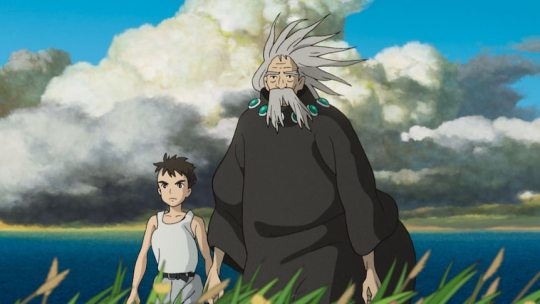
The tower is the central mystery point of the movie - a literal mystical rock that crashed down from the heavens and later lured Mahito’s grand-grand uncle (let’s call him the Tower Master for convenience’s sake) into its depths. Within the tower is a mirage world filled with magic but no real living beings, controlled by the whims of the Tower Master and nothing else that remotely resembles logic or reality. The tower also contains a series of doors that seem to lead to different points in time, if the ending is to go by and how the 13 blocks are meant to be pieces of worlds the Tower Master has visited. So what is this strange and fantastic realm, and what role does it play in the overarching narrative?
My hypothesis is that the Tower is a pocket free from the influence of time (think like the TVA in Loki) - a separate island running parallel to the fabric of the universe that contains portals to different points of past, present, and future. By itself, the pocket has no life or substance; it must be filled by the imagination - pure imagination, untethered to reality - of its main (human) inhabitant. This is why most of the ships are illusions rather than real objects, why the parakeets are so ridiculously odd and behave nothing like real
birds, why the fish is the size of Kiriko’s damn ship. Anything that is real, has to be brought in from the real world (see: the pelicans, Himi, and Kiriko). This is also why the parakeet king immediately topples the tower: yes, he is not the Tower Master’s descendant, but he is also not inherently a real sentient being, and an imaginary object cannot in itself sustain a further imagination.
So why does the Tower Master choose to sequester himself in this alternate space, where he can only exist alone with his own mysterious creations? I think the Tower Master represents those of us who wish to escape from reality, to inhabit worlds which we can control, where pain doesn’t have to touch us if we don’t wish for it (whether I’m projecting reallyyyyy hard at this point does not matter ok). He is an insanely avid reader, with books literally piled in small mountains throughout his living quarters, and don’t we readers (i.e me, again) always wish for escapism? The Tower Master, then, is an example of those who would rather become entrapped in our own minds rather than deal with the world beyond us - maybe, even in a way, a little like Miyazaki himself, whose imagination is so powerful but is also extremely singular and all-consuming, anchoring him to his creative work without reprieve of retirement until his reserves run dry (not to imply that the man is a hermit or that I want him to retire, quite the opposite in fact, but parallels, no matter how shaky, can still be drawn).
This, too, explains why the Tower Master needs Mahito to control the world for him. It is not because he’s grown old, since he cannot be affected by time in the Tower, but it is because his imagination is stagnating - he is no longer capable of finding new ways to balance the tower, he cannot sustain the fantasy any longer. In itself, this can already serve as a message from Miyazaki - we cannot hope to live only within the confines of our minds if we do not interact at all with the real world, because then at some point we will run out of material, of lived experiences to build on top of, and threaten to crumble the fragile imaginary world we have created.
Himi and her fire powers

Himi is a strange hiccup in the system - a rare occurrence of a living person in this fantasy playland that wasn’t brought into it during Mahito’s own entrance, like Kiriko. This theory is a little bit out there, I can totally appreciate that myself, but remember that one year in which Mahiko disappeared from the real world and then came back completely unchanged? I think she chose to stay there for much longer than a year, knowing that time didn’t work the same in this pocket world and she always had the chance to return to her original timeline through the handy door-portals. I think Himi has stayed there essentially until she met Mahito - so long that she actually grew into a part of the fantasy, developing impossible pyrokinetic powers and becoming a set part of the landscape in exchange for extended youth. But this stay didn’t come without consequences. In the real world, Mahiko passes away in a fire, at a younger age than would be expected. Perhaps this, in itself, is a punishment for cheating time - the universe reclaiming the years that Himi spent in the Tower. It’s also definitely not a coincidence that Himi can control fire in the Tower, and dies by fire in the real world; a form of lethal poetic justice, if you will. Seeing Mahito was the trigger for Himi to leave, to embrace her own destiny, because she could now see and be proud of the outcomes of her life and not have regrets about missing out on the life passing her by. (This interpretation would then necessarily imply a deterministic version of life and time, so it’s probably not everyone’s cup of tea, but I think it makes sense in this version because you see doors way farther down than the present which Mahito steps into.)
The starving pelicans
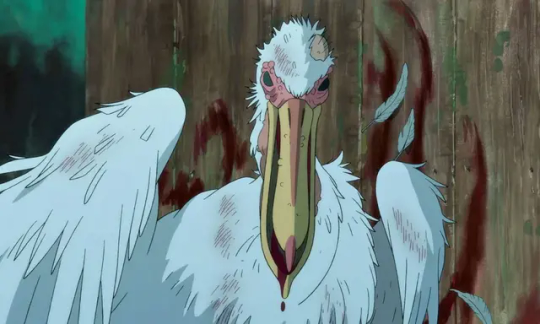
The pelicans are another anomaly because they, too, are not figments of the Tower Master’s imagination, but instead have been brought into this fantasy world, for one reason or another, likely against their will. And this is where the Tower Master’s escape from reality cracks and burns at the foundation - he creates harm rather than good when he brings in the pelicans, because he does not account for the fact that they cannot exist without a source of food, and they then are forced to eat the Warawara to survive. The movie states that the Warawara are like baby souls, who ascend to become new lives, but I think it’s a little more metaphorical than literal rebirth. For me the Warawara are metaphorical ideas or seedlings of inspiration, the only parts of the Tower Master’s creations which aren’t fully formed, but allowed to grow by themselves and escape into the world - like passing the spark of creation to others outside the Tower. And the pelicans, involuntary prisoners of the Tower Master’s fantasy world, must prey on the Warawara before they have the chance to become real. This can be seen (if you squint real hard and do some violent spins so your vision is hella blurry) as the beginning of the end of the Tower Master’s reign - the forceful inclusion of other sentient beings inside his imagination doesn’t help him enrich his internal realm, but rather snuffs out the genuine inspiration that he could be passing onto others, creating pain where the Tower Master hoped to be spared from it.
Mahito’s rejection of the Tower
So with this central “Tower as escapism” theory, what does Mahito’s rejection to take over for the Tower Master mean? There is a moment that was so subtly powerful in that final exchange between the two, when Mahito stops denying the truth by telling everyone that he got his scar from falling, and instead admits that self-harm was the actual cause. At the beginning of the movie, I viewed that moment of very painful self-harm as Mahito’s wish to withdraw from the challenges of life - to live in isolation away from the grief over losing his mother, the challenges of being the rich new kid in town, the overwhelming discomfort of seeing his father shack up with his aunt. His reality is agonizing for him, and the fantasy land is so beautiful in its strange way that it could become a safe haven away from his trauma. But when Mahito says “no”, he is choosing reality; he is choosing to do the hard work, to face all the hardships life can throw at him, because he feels finally strong enough to not need to use imagination as an escapist crutch. In those final moments, Mahito is choosing to live in a world that he cannot control, because no matter how tough things get, he doesn’t have to do it alone - and that’s what I think Miyazaki is telling us too.
Of course, the movie also deals with themes of class conflict and war profiteering; grief and acceptance; continuing your ancestors’ legacies versus paving your own path, which many have already discussed and I don’t particularly have anything new to add to. Regardless, these themes are masterfully woven into the plot, as per usual, and serve to elevate the movie’s emotional impact into something heart-twisting and truly unforgettable.
Alright, ramble over - back to fandom lurking!
#the boy and the heron#studio ghibli#hayao miyazaki#the boy and the heron spoilers#robin rambles#the kind of movie that makes you think#or perhaps overthink??#the boy and the heron meta
218 notes
·
View notes
Text
One of my favorite things to do is discover new parallels and breadcrumbs in ACOTAR that SJM strewn for us in her writing.
SJM has been actively planning the Archeron sisters’ books since ACOMAF.
In an ACOSF interview, SJM talked about how while editing ACOMAF, she was currently writing ACOWAR and already thinking about the journeys Nesta and Elain were “in the middle of,” laying the foundation for their books after she infamously pitched her editor their stories over drinks.
Which brings me back to the larger Sleeping Beauty meta that Elain and Azriel have been interwoven with throughout the series and a prediction I have for their book.
Let’s begin 🤓
THE EVIDENCE
In ACOTAR, the inner shields of a characters’ mind are a large part of the imagery surrounding them, as seen through Feyre’s Daemati powers.
Let’s start by looking at Elain’s:
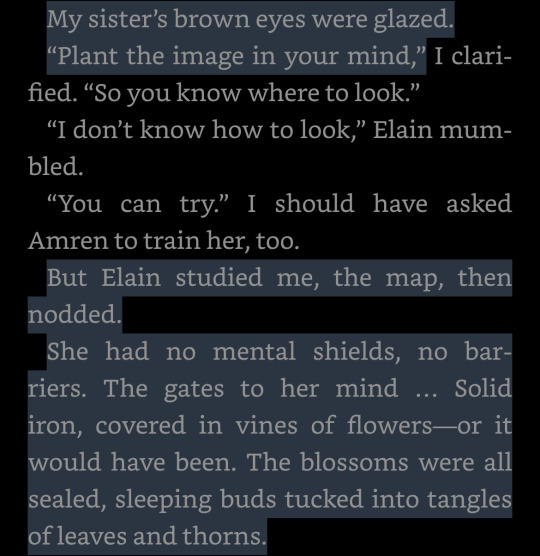
Solid iron. Covered in vines of flowers. Blossoms sealed, sleeping buds tangled in leaves and thorns.
This imagery screams Sleeping Beauty. And it also harkens back to the post I made about the imagery of the beasts in the Hewn City, who Feyre compares to Azriel and Cassian.
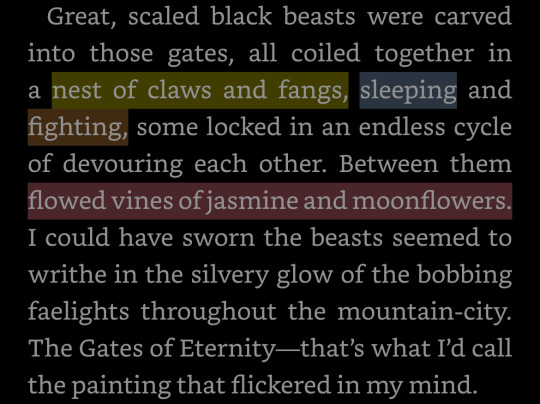
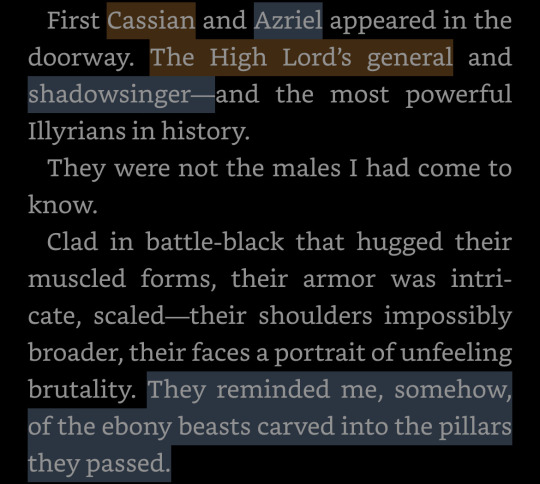
This repetition of imagery and symbolism isn’t a mistake. The sleeping beast amid vines of jasmine and moonflowers. It’s a deliberate echo of language used to tie both couples and their themes together.
Which then leads us to Nesta’s mind:
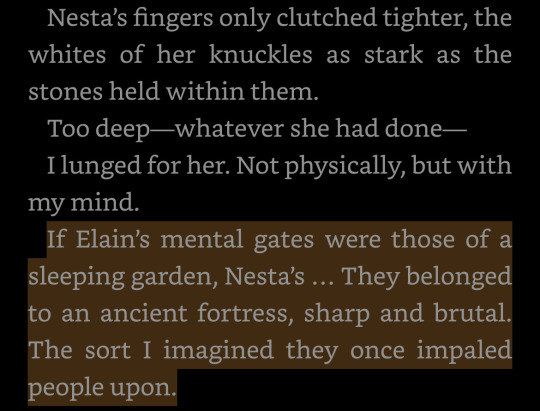
Nesta’s mind evokes images of war, a continually repeated motif that aligns with Cassian, their larger roles in their family structures, their drive to fight and protect, and for Nesta in particular, the visual manifestation of what she has to overcome in her journey. Not just within herself but with Cassian.
How do we know? Well, SJM told us.
In ACOSF, when Cassian and Nesta’s mating bond is revealed.
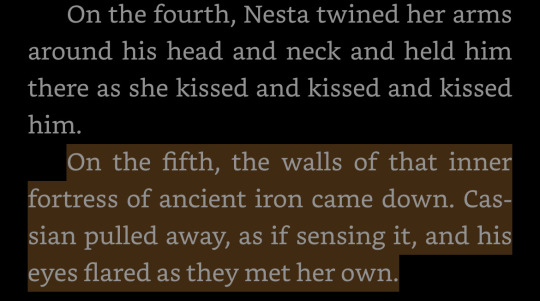
It’s only after Nesta bares her soul to Cassian and they meet in their mutual coupling of acceptance together that their mating bond truly comes to light and the threads of that bond are finally woven together in harmony.
So what does this mean for Azriel and Elain?
For the restless Spymaster, who “can’t sleep” despite his shadows imploring him to, and the Seer who’s “always dreaming these days,” I believe that like how Nesta’s inner walls came down when her and Cassian accept the mating bond, Azriel and Elain’s mating bond is somehow asleep, waiting to be awoken like the slumbering gates to Elain’s mind. Only then can their bond be brought to light like the sun at dawn, as right now it is asleep and half-hidden in shadows.
While the nuances of the narrative for how their “sleeping bond” would be revealed are still a mystery until we get their book, the foundation for a story of their love awakening and blooming is scattered across the series (“color bloomed high on Azriel’s golden-brown cheeks,” anyone?).
Some ideas to consider:
Could Azriel and Elain’s bond be Mother-blessed? Could the faebane arrow from ACOMAF have led the Cauldron to give Elain to Lucien instead, in defiance of the Mother? Did Koschei cast a spell to tie Lucien to another when he alone could be one to break Vassa’s curse with True Love’s kiss as a Spell-Cleaver? Will Elain and Azriel “weave” a bond of their own making?
I’m so excited to find out what SJM has in store for Elain and her journey where she will fully bloom with the love of her life 🌸💙
#acotar#elriel#pro elriel#elain archeron#pro elain#azriel#elain and azriel#azriel and elain#elriel supremacy#elain x azriel#pro azriel#acotar theory#acotar thoughts
136 notes
·
View notes
Text
Minato & Kushina: A "Deep Dive" Analysis (Section B, Part II)
Earlier parts here.
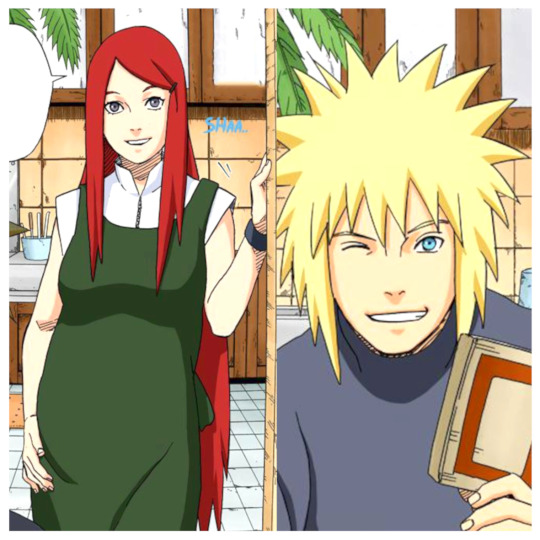
So far we've explored Minato and Kushina's oneness in terms of the Hokageship. But what of their personal hopes and dreams?
(Section B) II. Minato and Kushina as Types
Genin-Kushina speaks of Minato being able to “make all of [her] dreams come true,” and spirit-Kushina thinks, in her final farewell, “our hopes really did reach our son.” On his deathbed, Jiraiya thinks of Naruto as having "inherited Minato and Kushina’s hopes" and makes a direct link between those hopes and the hero of his novel.
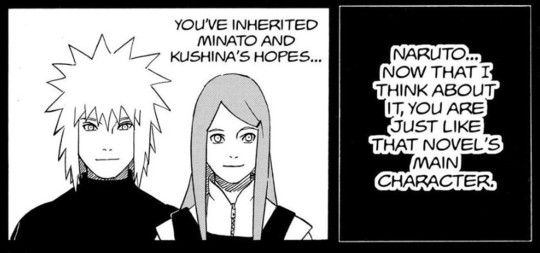
The novel’s hero embarks on a mission to bring peace, and the couple name their son – their future and legacy – after him. Why? Because this “Naruto” embodies their hopes and dream: peace. They grew up in an era of war. Kushina lost her village and is a prisoner and weapon at Konoha’s beck and call. Minato loses two of his students, fails to fix the third's trauma, and sees the woman he loves suffer her entire life being the jinchūriki.
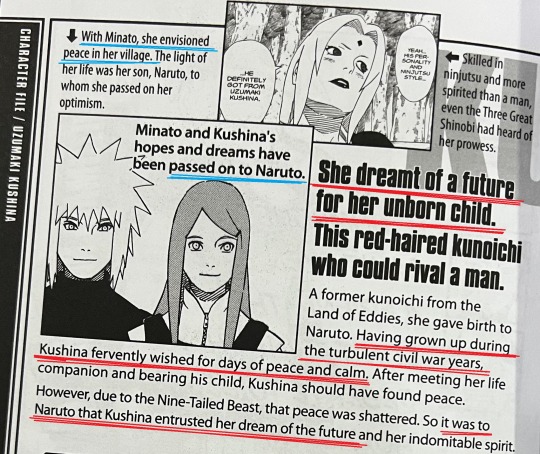
Furthermore, Minato is Jiraiya’s student, whose will he also inherits – harkening to the prophesied shinobi who will usher in an era of peace. A "savior" whom I will call, to maintain the parents' vision in mind, "peacemaker."
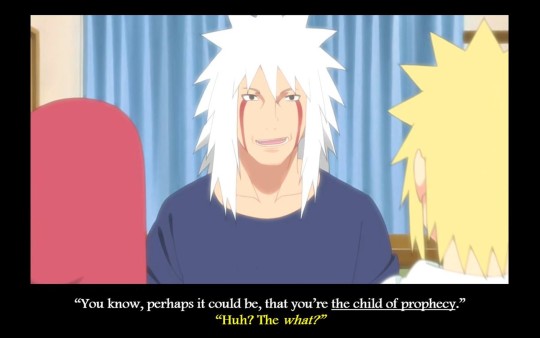
Which, of course, brings us to Minato and Kushina’s living legacy.
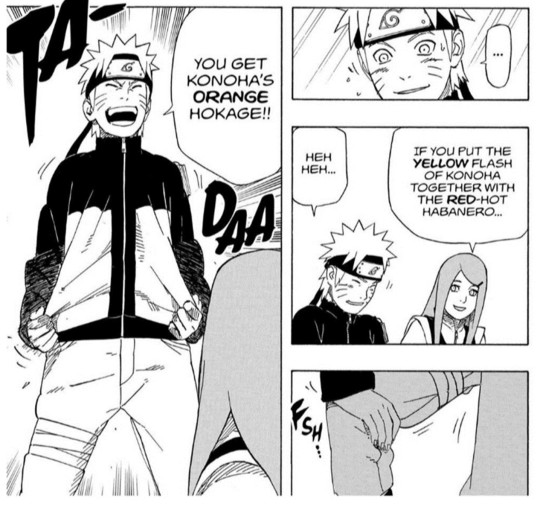
Naruto, this “child of prophecy,” dubs himself “Konoha’s Orange Hokage” as an amalgamation of the Yellow Flash and Red-Hot Habanero. By extension, thus, the peacemaker title belongs to Minato and Kushina together, embodied in the living, breathing, walking result of their love.
We touched on Naruto inheriting his parents’ love and redeeming Kurama (turning Hatred himself into a vessel of love). But moreover, as Kurama’s jinchūriki he is the 'key' to changing the future. Passed from Jiraiya to Minato to Naruto is the mission of bringing peace. And passed from Kushina to Naruto is the means of accomplishing it.
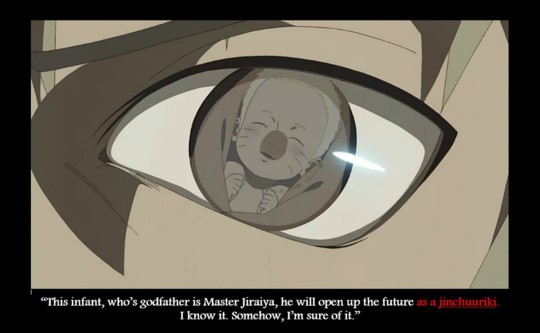
Jiraiya first believes Minato is the child of prophecy (chapter: Minato’s Dead Demon Consuming Seal), and the anime version of their talk features a pregnant Kushina with them. So right as Minato learns of the prophecy, their child – its fulfiller – is present. Foreshadowed is the legacy Minato will bestow both as a peacemaker and the peacemaker’s father.
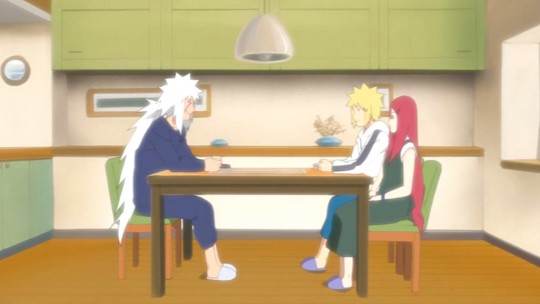
[On the topic of 'savior,' Naruto has been called by many fans a ‘Christ figure.’ This trope is actually a misnomer. Do you know what Jesus Christ actually did, what salvation actually is? Check out this 1-minute video:
youtube
To define the saviorship motif in Naruto, we're talking about something very different. The series themes salvation as a ‘saving’ from hatred internal and external; a reconciling peace with oneself and peace between nations.]
Jiraiya and Minato’s conversation is not the first foreshadowing of the savior theme. The entire series kicks off, in fact, with the following prologue:
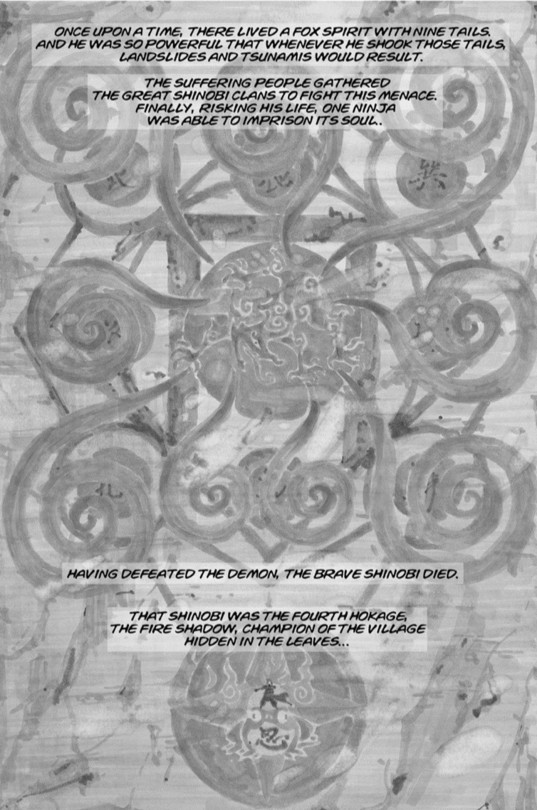
Minato is introduced as Konoha’s “champion” in direct conjunction with “Fourth Hokage.” Then we jump to the title of Chapter 1: Uzumaki Naruto! Naruto debuts desecrating the Hokage rock faces – a jokey hint that he’ll one day surpass them all.
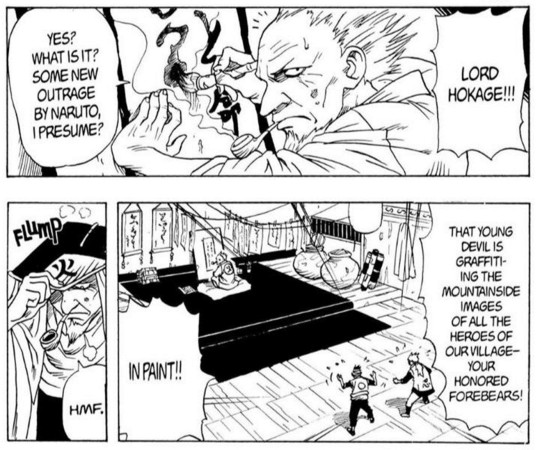
Pranking which, for a fun fact, is an "interest" of Kushina's per one of the databooks.
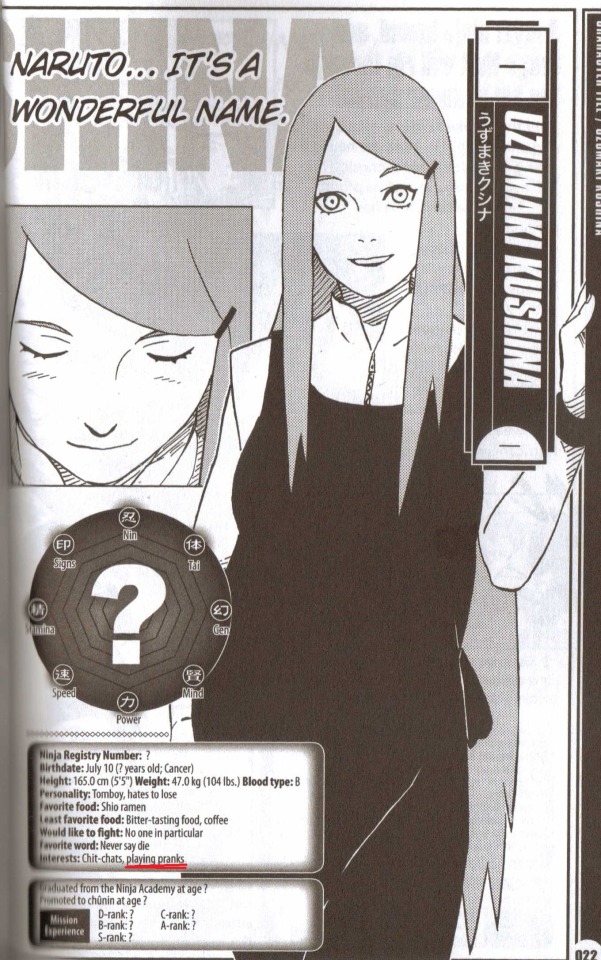
We find mentions of “Fourth Hokage” throughout the story and learn that Naruto reminds Jiraiya of this renowned hero. He appears in person in the prelude to the timeskip – the ‘second prologue’ if you will – as Obito’s sensei. Then we jump to a 15-year-old Naruto returning to the village with Jiraiya. The parallelism in the two ‘prologues’ juxtaposes Minato and Naruto in the grand narrative: Minato is the typological peacemaker who secures the future; Naruto is the legacy peacemaker who carries it out. Minato is both a peacemaker himself and a ‘type’ (a ‘pre-figure’) of the one to come.
How is Minato a peacemaker himself and a type? His love gave Kushina the peace to overcome Kurama, prefiguring the internal peace Naruto will help others achieve. And his actions contributed to ending the Third Great War, prefiguring the external peace Naruto will usher with the Fourth.

Framing Jiraiya’s flashback of Naruto’s parents is the theme of the child of prophecy, in the contrasts between his three students who were candidates for the role. Jiraiya is killed by Nagato who lost faith and betrayed his teachings; he remembers Minato who held faith and died in that faith; and in remembering Minato’s faith he recalls his own faith in Naruto – that Naruto is the one who will see their mission through.
In this flashback Minato is visually removed from “Fourth Hokage:” he is in his plain attire without the cloak. He is verbally removed from Fourth Hokage, with not a mention relating to the title. And we know that he is Hokage because Kushina is (heavily) pregnant.
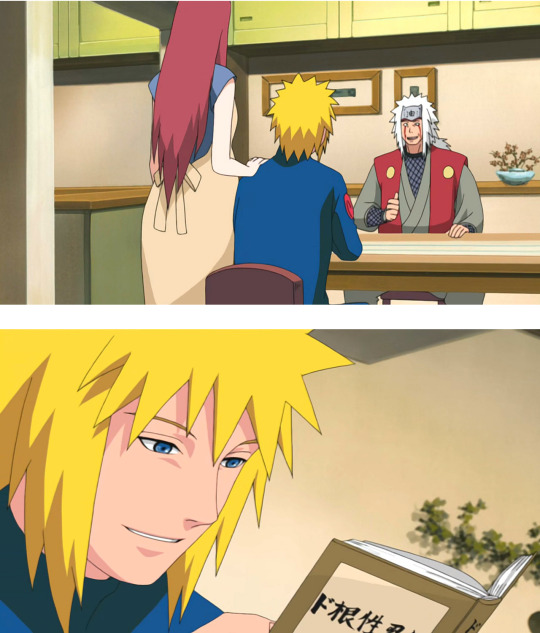
Minato in this scene is three things, linked in the connection of three wills. He is the student of author and sensei Jiraiya, whose will he has inherited. He is the husband of (heavily) pregnant Kushina, who shares (and carries the fulfiller of) that will. And he is the father of to-be-born Naruto, who will fulfil that will.
Moreover, this scene is entirely centered around them naming Naruto (the act of doing so in itself a symbol of passing on legacy). With their child being named after the hero in Jiraiya’s novel, we see the amalgamating of the to-be-parents’ and Jiraiya’s legacies into one.

Kushina likewise is met not as “Konoha’s jinchūriki” but Naruto’s mother – this moment being her first in-person appearance in the series. She is very heavily pregnant, Minato remarking on their “soon-to-born child,” and when she enters the room all attention is drawn to her belly swollen with Naruto.

In both the anime and game versions, in fact, we see Kushina’s belly before we see the rest of her. In the anime, she waddles tummy-first into the frame, and after close-up shots of her and Jiraiya is a close-up of her caressing it. In the game (Storm Generations), we have a mid-shot of just her belly, from which the camera pans up to her face.
[Kushina rubbing her belly could also imply that the baby is kicking, which would further make Naruto not just the topic of, but active in the scene. (Though of course, pregnant women often rub their bellies. Just a thought.)]
Kushina’s mention-debut too is in direct conjunction with Naruto: Tsunade says Naruto takes after “his mother” before she introduces her name. The first word Kushina herself speaks is “Naruto,” with her remark that the name is “wonderful.” And she does the same in her second appearance 16 years later when she saves him from Kurama.
Further, Kushina's mention-debut draws a contrast between her and Minato in relation to their son. Where we’ve been led up to this point to believe that Naruto is a ‘mini-Minato’ (reminding Jiraiya of “Lord Fourth,” having the Hokage dream and so forth), Jiraiya and Tsunade reveal the key twist: Naruto is LESS like Minato and VERY MUCH like Kushina.
Tsunade attributes Naruto’s personality and ninjutsu style to “definitely” being from Kushina. Additionally, aside from his hair and eye-color, his face is the splitting image of his mother’s. (We are in no way discrediting Minato here – Naruto is in many ways, as we’ll discuss, like his father too. The emphasis is that he is far less like Minato in comparison.)
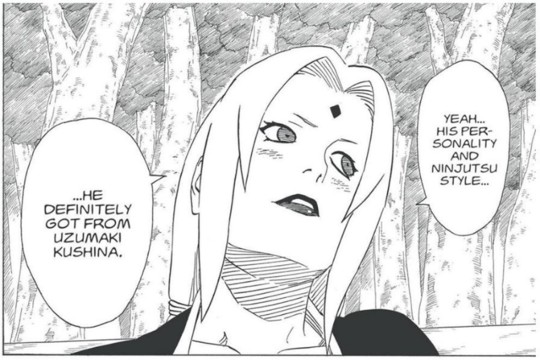
[It is greatly fitting that Jiraiya and Tsunade are the ones to exposit these details, being the prior generation characters themselves in the circle of legacy. As Mito’s granddaughter, Tsunade is essentially ‘the Uzumaki’ of her generation. She also sits in a curious position in the Hokage line: succeeding Hiruzen who (preceded and) succeeded Minato; and preceding Kakashi who will precede Naruto (i.e. one Hokage seat from each). Further, in dynamics and traits we have a multi-generation parallel: Hashirama and Mito; Jiraiya and Tsunade; Minato and Kushina; Naruto and Sakura; and Boruto and Sarada/Himawari. This is something we will visit later too, for there is a plethora of parallels here. (Note I said “dynamics and traits,” not “ships,” so hold your pitchforks. We'll certainly discuss Hinata too.)]
So Tsunade, our Uzumaki ‘cousin,’ tells us that Naruto is most like his mother, with Jiraiya’s agreement and reveal that he does not in fact possess Minato’s genius. (Contrary to a common fan misperception, Naruto is a people and battle genius. So by this lack we mean academic, Kushina herself admitting she was bad at studying.) These statements follow Jiraiya and Tsunade discussing their faith in Naruto becoming Hokage. And here we have in subtext something which gets very much overlooked.
Recall me saying that Kushina gives Naruto the means of bringing peace while Minato (and Jiraiya) pass on the mission. That means is not only Kurama, but the very trait at the core of Naruto’s personality.
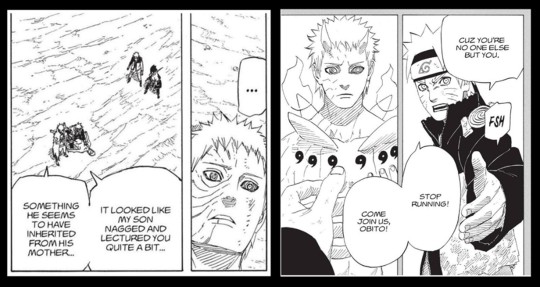
Yes, we are talking about his signature technique: the soul-piercing ‘talk no jutsu.’
It is of no insignificance that Minato’s dying words to Naruto are “ditto your loquacious mother” (or in the anime, "your talkative mom said it all"). Nor that Naruto repeats his mother’s speech to Minato verbatim after he has helped save the world. Minato’s dying act is to sacrifice himself, putting his faith in his son WITH Kushina's chakra. His final departure to the Pure Lands is a following of that faith fulfilled.

It is also of no insignificance that Kushina’s self-introduction to Naruto is on his inheriting her talkativeness. Naruto realizes who she is not by her near-identical face, nor by the fact that he had met his father under similar circumstances, but by her verbal tick 'ttebane like his 'ttebayo. Ironically, her “Minato didn’t say anything?” line alludes to this even further: Kushina is the one to pass on the passionate, empathetic talkative quirk; one Minato doesn't have.
(Let us not distort the context: Minato had far less time with Naruto so he couldn't say much. But the emphasis still stands, for he ensured Kushina would have far more time, saying, “There are things that only you can tell him. Things that I can’t. That’s a mother’s role.”)
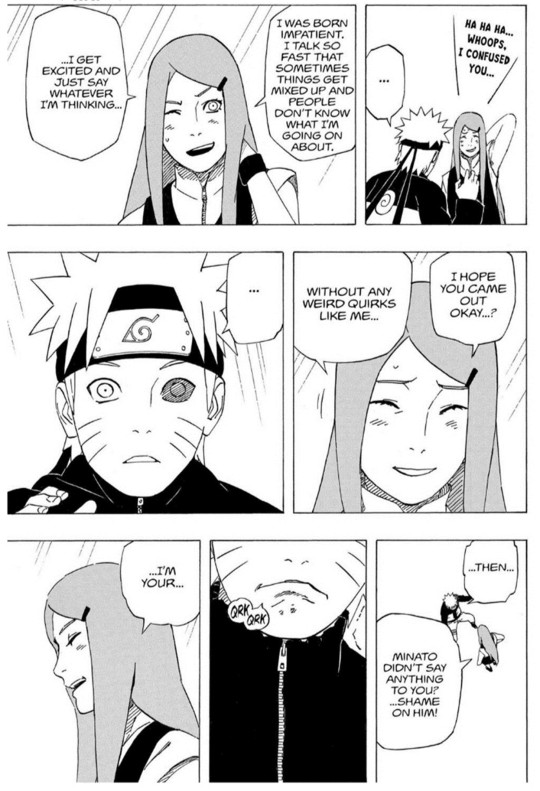
Further, Kushina's starkest display of this quirk is while she is pregnant with Naruto. Recalling his promise to her, Edo-Minato thinks back to her rambling about the future traits of their baby. And when he calms her, asking how she could possibly know, she replies with confidence, “Because I’m his mother.” Look at the manner in which she says it here below: her expression reads, "Well, duh." She is fully convinced that their baby is a boy and that he will want to be Hokage, that he will act up when his father is busy and be a little trouble-maker.

And she works herself into a state over it, showing her intuition and empathy. She envisions Naruto acting out to get attention when feeling deprived due to Minato's work. She envisions how this will further affect his behavior, leading him to "defy his teachers" and so on. What we see is a display of how deeply she can read others on circumstance, and what is played in the fretting-mom sense gets passed to the child in her womb. The intuition and empathy by which this baby will peer into people's hearts and expose their desires and philosophies, expressed through his talk-no-jutsu.


Why is this so crucial? Because Kushina is a ‘type’ for the “child of prophecy” too. Naruto is Minato’s legacy as rescuer; he is Kushina’s as redeemer. Two aspects wholly intertwined in him achieving their dream of peace.
And on that note, we can now delve further into internal conflicts – beginning with Minato journeying on his personal redemption arc.
Section B, Part III here.
#naruto#naruto shippuden#naruto gaiden#the whorl within the spiral#boruto#manga#anime#namikaze minato#minato namikaze#minato#uzumaki kushina#kushina uzumaki#kushina#uzumaki naruto#naruto uzumaki#jiraiya#tsunade#senju tsunade#tsunade senju#hokage#my deep dives#character analysis#kurama#minato x kushina#minakushi
41 notes
·
View notes
Text
The Heart of a Toy-An Analysis of KH3
Ever since finishing Kingdom Hearts 2 Nomura has been insistent on including Toy story in Kingdom hearts 3 even going as far as to say in an interview with Jen Simpkins from GameRader’s Edge Magazine, “After we were done with Kingdom Hearts II and were starting to consider III, we started talks with Disney, I remember saying, ‘If we can’t use Pixar, then we can’t have a third game.’ It’s that important to the game series,” (Nomura). And it’s clear to see why Nomura put so much importance on Toy Story once you realize how much its story connects to and reinforces the themes and mythos of Kingdom Hearts.
Toy Box is a magical world. While it appears to be the same of our own it holds a great secret, Toys are alive. When a child looks away a Toy springs to life revealing a heart of their very own, but that begs the question, how does a toy possess a heart? In Kingdom Hearts 3 we learn the answer. A toy is given a heart by the love of children. When a child looks upon a toy they do not see a cheap piece of plastic but instead they see a friend with a heart of its own to be loved and cherished. And it is that belief which truly gives the toys a heart. This is what Woody means when he says the Toys within Galaxy Toys have yet to figure it out. That they have yet to realize the love of a child and thus are empty shells without a heart of their own.
As Young Xehanort himself points out this draws heavily parallels between the toys and Nobodies, both incomplete creatures searching for their missing Half, but this parallel isn't just there to establish why the heartless can possess the empty toys. The point of this Parallel is to answer a question that has haunted the narrative of Kingdom Hearts since the events of KH2, Why does Roxas have a heart?
Roxas, just like his somebody, is an anomaly in the world of Kingdom Hearts. He is a nobody that bears neither the face nor the memories of his original self. He is more shallow than any other nobody, less a body without a heart and more a broken shell. Yet not only was Roxas the first nobody to grow a heart but said heart was his alone. Throughout the events of Days Roxas grows from a barely living husk of a man to one who definitely proclaims his own existence and personhood. And this is thanks to the bonds forged in his first year. Just like how a Toy is given a heart through the eyes of a child Roxas was given a heart by those that were drawn to him. From those he shared ice cream with under the twilight sky, the trio he befriended ever so slightly on a lazy afternoon, the fairy tale heroes his somebody cherished, and even the forgotten longing of brothership from the King of Nothing Roxas began to be shaped by those around him. His soul is learning the rules of the world, the nature of a heart, the simple joys of friendship, the sting of betrayal, and the heartbreak of goodbyes. As Roxas’s newborn heart grew with every day he too gained the ability to see the hearts of others whether it be in the Flurry of Dancing Flames whose false smile became true or the Puppet who became a Real Girl. But perhaps the final proof of Roxas' heart lies with his own “Andy”. Sora at first refused to see his “Woody��, whether it be or out of ignorance or prejudice Sora denied Roxas existence, refusing to heed the clues of the other half or feel his presence in his heart. That is until Roxas forced Sora to acknowledge him. Within the very core of his heart Sora came face to face with Roxas and was forced to acknowledge their connection through the Keyblades in order to win the fight. With Roxas’s tragedy laid before him Sora is at last ready to accept the truth and later on in the realm of sleep acknowledge not only Roxas’s existence but that he has a heart of his own. Just like how Andy gave woody and Buzz hearts by writing his name on them, Sora gives his Nobody a heart by acknowledging him as his own person.
While Toy Box Provides many answers it also raises a new question. If A toy gets its heart from a child’s love what happens when a toy becomes worlds apart from its kid? This question plaques Buzz throughout the events of Toy Box. With every possessed toy they defeat Buzz sees himself in them more and more. He fears that as he continues to drift away from Andy he too will lose his heart and become just another lifeless puppet . Ironically enough it is this very fear of separation that allows the darkness to grow inside Buzz making him another weapon for the heartless. In contrast to Buzz Woody is able to resist the pull of darkness. Woody has already dealt with the fear of separation first through his anxiety over being replaced by Buzz as Andy's favorite toy and second when he became paranoid over the idea of Andy abandoning if he broke. Both events taught Woody something important that yes his time with Andy is not permanent, that someday they will part but that doesn't mean their bond will ever end. Thanks to the events of Toy story 1 and 2 Woody has the resolve to face the hardships of Young Xehanort’s trials and keep his faith in Andy. And this is why Woody is the one to challenge Young Xehanort.
ToyBox is ultimately an encapsulation of the themes of Kingdom Hearts. This can be seen through the many parallels between The World and KH as a series. We’ve already pointed out the connection between the toys and Nobodies but what about how the world is split in two just like in dream drop Distance. Or how about the toy's separation from Andy mirrors Sora’s separation from Riku and Kairi in KH1 with Woody managing to resist the pull to darkness and put his faith in the light because he knows the true strength of a heart thanks to his connections. And lets not forget Buzz’s possession calling back to Riku and Terra’s fall to darkness. Even Buzz’s salvation continues to draw parallels between him and Riku with how they are both saved from the darkness by their friends never giving up on them. Yes Toy Box is a world built up from the ground to parallel the events of Kingdom Hearts, but why is that? Why out of all the other worlds in KH3 was this one chosen to hold a mirror directly to Sora’s journey? Well that's simple because the story of Toy Story is at its core a story about friendship, about how bonds can last forever even if the time spent together is finite.
There is another purpose however for Why Toy Box is set up this way. Toy Box’s main role in the overall narrative of Kingdom Hearts 3 is to be a test trial for his destined clash with Master Xehanort. The main antagonist of Toy Box is Young Xehanort who split the world in two and took the toys away from Andy in order to conduct an experiment. Said experiment was to see whether or not a toy is not only capable of having a heart but if they can carry darkness. This is all done as part of the True Organization's goal to achieve their final vessel but as the world’s story progresses it becomes Clear that Young Xehanort has his own reasons for doing all this. Young Xehnaort wishes to use this experiment to validate himself. Young Xehanort is the earliest version of Xehanort and thus represents his cynical beliefs at their most immature. He believes that not only is darkness the heart’s true nature but that strength comes from isolation. That it is not bonds and connections that make a heart strong but instead the never ending darkness that is born from fighting alone. It is a fundamentally childish ideal not born from understanding but instead self serving cynicism. And that is why Young Xehnort was chosen to be the villain of this world as his childish ideals serve as the perfect test run for Sora, allowing him to confront a weaker version of Xehnort’s ideals and see just how far his own ideals can stand up against him. Ultimately Sora manages to pass the test but not without some help. In the End Woody is the one to ultimately confront Young Xehanort and Save Buzz. Using his maturity Woody is able to shut down Young Xehanort’s childish worldview and break the darkness imprisoning Buzz. So While Sora is victorious in the end it does beg the question, Is Sora truly ready to confront Master Xehanort?
Source
https://www.kh13.com/news/edge-magazine-interviews-tetsuya-nomura-and-tai-yasue-on-pixar-in-kingdom-hearts-iii-the-switch-to-unreal-engine-4-and-more-r2799/
#kingdom hearts#kh#sora#disney#kh sora#kingdom hearts 3#kh analysis#kh essay#PriPH Essay#my essays#kh3 spoilers#kh riku#kh3#disney pixar#pixar animation studios#pixar#woody#buzz lightyear#toy story#toy box#kh xehanort#young xehanort#nobody#KH nobody#kh axel#kh xion#kh xemnas#organization xiii
43 notes
·
View notes
Text
I need to make a longer post later but my GOD dexter the show is fucking obsessed with foils mirrors and parallels which is great because I am too
anyway we can broadly divide people in dexter's life who are his confidantes etc into a few categories: Family, Lovers, Apprentices, Killers, Angels, Devils, and Hunters. these overlap so so often. let me explain them. this got long so lemme add a cut.
Family are his either literal (biological or adopted) or spiritual family (Vogel). self explanatory. We can divide this into Parents, Children, and Siblings. This has Harry Morgan, Debra Morgan, Laura Moser, Joseph Driscoll, Brian Moser, Evelyn Vogel (+ Oliver Saxon by extension), as well as Astor, Cody, and Harrison. Zach Hamilton is claimed as a 'spiritual son' also
Lovers is also self explanatory. He has 4 main lovers throughout the series: Rita Bennett, Lila West, Lumen Pierce, and Hannah McKay. He also has a few ancillary love interest type people - Luci the store clerk in "Nebraska", Mindy who asked him to the dance, Cassie who he got made to go on a date with, Trisha at the high school reunion, an unnamed woman he has sex with, and LaGuerta who makes unwelcome sexual advances
Apprentices are people he either teaches or attempts to teach the Code to in some form. There are four, by my estimate: Jeremy Downs in season 1, Miguel Prado, Lumen Pierce, and Zach Hamilton. Travis Marshall seems to fit in this category also despite differences
Killers are people he broadly relates to through shared murdering. This includes basically everyone he lays eyes on, but especially the Ice Truck Killer Brian Moser, Arthur Mitchell, Jonah Mitchell, Isaak Sirko, and three who become more than killers: Hannah McKay, Jeremy Downs, and Zach Hamilton
Angels are the people who inspire him to be morally better. These include Rita Bennett and Brother Sam as well as Harry and Deb Morgan. He also acts better for his children often. Occasionally his care for his Angels inspires him to kill people for them, but that's not their fault
Devils are the opposite of Angels and inspire him to act worse. Most blatant is his Dark Passenger, to the extent that exists outside of a justification. Brian and Lila are pretty clear Devils. Harry and Deb, interestingly, are Devils as well as Angels; both directly tell him to murder people. Evelyn Vogel encourages him to lean into his serial killing as well
Hunters 'know what Dexter is' or are chasing him down for Justice reasons (rather than because they are trying to kill him/his family). Doakes is the frontrunning Hunter - Joey Quinn sort of takes his narrative place. Lundy and also the Miami Metro PD is hunting the BHB but Lundy is the real dedicated Hunter. LaGuerta becomes a Hunter in Season 7 - a rare case of a developing Hunter. Elway in Season 8 is also a Hunter.
anyway lmk what you think + if you agree or disagree and any connections or categories you'd make + if you'd be interested in me continuing this analysis
14 notes
·
View notes
Text
hey guys. have you heard of hadestown.
(its a musical that meshes the myths of orpheus & eurydice and hades & persephone)
orpheus is a naive (sorta sheltered?) bard who acts on his whims while eurydice is a realistic and tough girl who's doing all she can to survive
hades is king of the underworld and keeps persephone there a lot of the year meaning there's a lot of winter up above
now hear me out.
3rd life.
scar as orpheus, grian as eurydice.
wedding song as scar proposing they take over the desert, the second verse being grian suggesting they take the dark oak. now, imagine all I've ever known as a dark night dancing in the desert not to mention, "its a sad tale, its a tragedy" (bonus: in a gathering storm eurydice calls for orpheus and he isn't there because he's off writing his song, narratively similar to grian calling for scar in double life when everyone was digging around for their sugar cane while scar was off accidentally lighting the place on fire and petting the jellie pandas)
extra bonus ideas:
persephone sounds like bdubs? like, listen to livin' it up on top. the gritty voice/singing and all her attitude (/pos) and some of the lyrics "who makes the summer sun shine bright?/thats right! persephone!" (he was the esmp2 sun god!) she sort of reminds me of the vibe bdubs gave off when he was ren the king's guy in s9 (my impression was he was kinda frantically running around at ren's whim, its not at all the same with hades and persephone but there's the sort of obeying a king thing)
leading me to my next thought of ren as hades. someone i was listening with said "winter has come" which made me think of "red winter is coming" dfhj
but another thought is just the last life ethubs divorce? seems very relevant with bdubs persephone parallels
also in hey little song bird hades refers to eurydice as a canary and we all know whos a canary
hermes (conductor of the train on the road to hell) and the fates play a narrator type role except hermes is more explicit while the fates are the humming in the back of your head they weave the path of how everything goes and you cant defy them
martyn throughout all the series is a sort of nomadic no solid home kinda guy and always self aware (he makes the lore-) which connects him to hermes for me but at the same time the fates are very much watcher/listener things so like bigb and martyn? (i don't know the lore sorry lol) i'd also say that somehow impulse's littlefinger flip floppy triple double agent character in third life gives a vibe like he knows whats going on in all the groups also connecting him to them for me
(i will say scar could fit hermes as well in being a sort of travelling sales person in last life and a bit in double life? also I've read dirges in the dark which means i see him and the devil and making deals with complicated clauses as very interconnected)
my final note (and being a devils advocate)
scar could also parallel hades.
if you watch his perspective he's very happygolucky and doesn't seem to get the real weight of the situation and such but from other perspectives his and grians deal seems kinda like he's had grian sign away his soul or he's kidnapped grian and there's some stockholm syndrome happening (its actually grians guilt but i digress)
hades convinces eurydice (scar is a silver tongued man) to sign away her soul to him and also the story of hades and persephone is that he kidnaps her and she eats some pomegranite and has to stay in the underworld for part of the year
sooo yeah. paralells between hadestown and 3rd life/life series. enjoy.
#the block men have leaked into my everyday thoughts#oh no#gdujfkmg#hadestown#hadestown musical#orpheus and eurydice#orpheus#eurydice#orphydice#hades#persephone#hermes#the fates#greek mythology#3rd life#last life#double life#limited life#secret life#life series#life smp#traffic smp#trafficshipping#grian#goodtimeswithscar#gtwscar#gtws#ethoslab#bdouble0#bdoubleo
44 notes
·
View notes
Text
SJM is a Zutara Shipper? That sounds like Elucien....let me explain
It was recently brought to my attention that Sarah hinted in 2017 at being a Zuko/Katara shipper in the Avatar the Last Airbender series. This was exciting to hear as I was in the ATLA fandom over a decade ago and Zuko/Katara was my first OTP and introduction to fandom. I have loved them a long time and they will always hold a special place in my heart. I want to explore why Sarah shipping Zutara is really important when it comes to Elucien because there are a lot of great parallels.
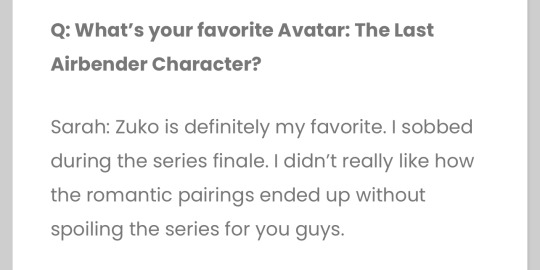
Note: if you know anything about the ATLA shipping fandom/wars...you immediately know what she means by this. Zutara is a fanon ship that was often baited by the writers. Her disappointment is a shared, common reaction to the ship.
A very long, detailed analysis is below the cut. This NOT for ATLA discourse. This is intended to focus SOLELY on Elucien. Read below if you are a fan of Zutara/Elucien....
ATLA Characters vs ACOTAR Characters
Let's start with the characters themselves.
We have Prince Zuko, the exiled and scarred prince of the Fire Nation, who was banished after his evil, power-hungry father (the Fire Lord) horribly punished him for embarrassing him with his kindness (not wanting innocent soldiers to be used as bait in war), which he viewed as morally inferior and weak. It is implied his mother, a gentle-hearted woman, was abused in the marriage. She disappeared when he was young to maintain her husband's political power, only so that her children would live. The loss of his mother is his greatest trauma, along with his desire to go back home and gain his honor and father's acceptance.
Then we have Lucien Vanserra, exiled and scarred son of the Autumn Court, who had to flee after his evil, power-hungry father (the High Lord) horribly punished him for embarrassing him with his relationship with a lower-Fae female, which he viewed as repulsive and below their High Fae status. It is implied his mother, a gentle-hearted woman, was abused in the marriage. His lover was brutally murdered by the hands of his father/brothers and he had to flee, never having the chance to see his mother again. Losing Jesminda is his greatest trauma, likely along with losing his home, Court, and family.
Let's also not forget...they BOTH WEILD FIRE! I do think the Lucien/Zuko comparison is quite obvious and direct, where the Elain/Katara is a bit more symbolic.
For our ladies, we have Katara, master waterbender of the Southern Water Tribe. She is the youngest daughter of the Chief. She begins the journey as someone untrained and incapable of bending her own element, in a small, impoverished village due to the effects of war and destruction on their nation/culture by the Fire Nation. Her mother was tragically murdered by the Fire Nation in order to save her daughter's life. This is singularly her greatest trauma. Throughout the show, we see Katara become a powerful and master bender.
Finally, we have Elain Archeron, who was once human and is the middle sister in her family. She was the daughter of a once-successful merchant. She also loses her mother and is very close to her father, who she also tragically loses in the war. She loses her humanity and her fiance, Graysen, in one fell swoop when they put her in the Cauldron. This is singularly her greatest trauma, one that we see she has trouble letting go, even becoming practically comatose when it first happens. We later learn Elain possesses magic and is a seer.
A little less here, but I am not surprised. Katara and Elain, personality-wise, are very different. However, I will add that both Elain/Katara are often associated as symbols of HOPE in the narrative. But this brings me to my next point which is where I believe SJM was influenced by Zutara when writing Elucien....
Shared Grief as the Catalyst

Every Zuko/Katara shipper knows the crux of their relationship is from their shared trauma. Despite being on opposite ends of the war, they both carry an immense grief in losing their mothers to the war. It is the first thing they realize they have in common, the first moment they share a genuine, sincere connection, enough for them to reach out and open up to each other.
Elain and Lucien also have a shared trauma. They both lost their first loves/fiances. Lucien lost her tragically. Elain lost him in a brutal rejection. It broke both of their hearts, and they both carry grief and complicated emotions around it.
The hurt and pain brought Zutara together. As a result, they understand each other in ways others can't. I have no doubt that Elucien will spark from a similar place of understanding.
Complimentary Symbolism
One of the most beautiful parts of Zuko/Katara is the use of opposite/complimentary symbolism. Two halves of a whole. Balance and unity.
Zuko= Fire and Sun and Blue Spirit Katara= Water and Moon and Painted Lady
Lol can you believe we got the line below...I couldn't come up with a more romantic symbolic line if I tried and that's canon folks
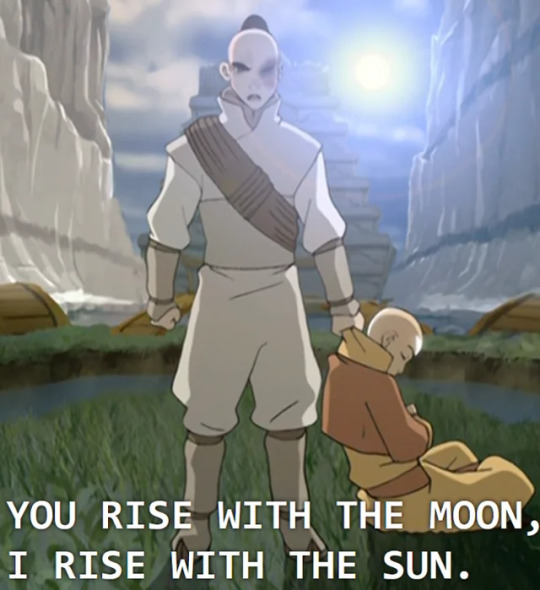
Lucien = Day and Fox and Spring/Loss
Elain = Flowers and Fawns and Spring/Life
Elain, often associated with gardens and flowers and roses, was asked what she needed at her lowest point. She said "Sunshine." Enter Lucien, the secret heir to Day Court and Helion, whose name means Light. The Fox and the Fawn. Elain "Made for Spring" Archeron and Lucien "Spring Court Emissary and Courtier" Vanserra. I wrote Spring/Loss and Spring/Life because Lucien had to see Spring become ruined/flee the one place he called home. There is strong foreshadowing that Elain will help in some way to revive spring and possibly bring it back to life, hopefully with Lucien's help.
Let's also not forget that Elain was formerly human and now living as a High Fae in the Night Court. Lucien is a High Fae who looked down on humans and now lives in the mortal lands. It's an interesting dynamic!
Betrayal
Okay buckle up. This one is important. The feeling of betrayal is important to the development of both ships. Let me break this down.
Katara is a victim of the Fire Nation. Zuko is the prince of the Fire Nation who once hunted them down to retrieve the Avatar. She often conflated her feelings toward Zuko with her feelings regarding her mother's murder by the hands of the Fire Nation', as evidenced here.
Katara: I'm sorry I yelled at you before. Zuko: It doesn't matter. Katara: It's just that for so long now, whenever I would imagine the face of the enemy, it was your face.
We see these messy emotions come back when Zuko joins the team to teach Aang firebending.
Zuko: This isn't fair! Everyone else seems to trust me now! What is it with you? Katara: Oh, everyone trusts you now?! I was the first person to trust you! [Places her left hand on her heart.] Remember, back in Ba Sing Se. And you turned around and betrayed me, betrayed all of us! Zuko: What can I do to make it up to you? Katara: You really want to know? Hmm, maybe you could reconquer Ba Sing Se in the name of the Earth King. Or, I know! You could bring my mother back!
Now, at this point, we know she has not forgiven him for Ba Sing Se. Remember, this was the moment they shared their intimate connection over their shared Dead Mother trauma. (In an episode called The Crossroads of Destiny nonetheless). She offered to heal his scar, and later when given the chance to choose between what is right vs. what he wants....he chooses what he wants, which is to return home to his father for his acceptance. Katara took this as a personal betrayal and we see she still imagines his face as the enemy by demanding he bring her mother back (even though it isn't possible/he isn't responsible for it).
You know who else has mentioned betrayal?
For a long moment, Elain’s face did not shift, but those eyes seemed to focus a bit more. “Lucien,” she said at last, and he clenched his teacup to keep from shuddering at the sound of his name on her mouth. “From my sister’s stories. Her friend.” “Yes.” But Elain blinked slowly. “You were in Hybern.” “Yes.” It was all he could say. “You betrayed us.” He wished she’d shoved him out the window behind her. “It—it was a mistake.” Her eyes went frank and cold. “I was to be married in a few days.” He fought against the bristling rage, the irrational urge to find the male who’d claimed her and shred him apart. The words were a rasp as he instead said, “I know. I’m sorry.”
Elain associates Lucien's involvement with Ianthe/Hybern/The Cauldron as a personal betrayal. Lucien, much like Zuko, is sorry for his actions that have hurt her.
Both Zuko and Lucien don't argue about the anger/accusations of betrayal. They own it. They just want to make it right.
In the same episode of the snippet above ("You could bring my mother back!") Zuko and Katara go on their infamous "field trip" or journey together, just the two of them. Despite Katara's anger, the two of them are in perfect sync. They are the perfect team and pair, moving fluid in their elements, sneaking around enemy ships. Zuko defends her desire for closure (however dark it may be) against her friends and family wishes. He never questions her. He supports her emotionally. He yells at an enemy solider- "Don't lie! You look her in the eye and you tell me you don't remember what you did." (OH COME ON, what is hotter than that!?) In the end, she forgives him. Not because of what he did. But because he understands her and gives her space and places no expectations of who she is or what she should do. He accepts her. All the dark and pain and light inside.

Don't mind the romantic sunset in the background
Going on an adventure? Likely against the wishes of friends and family due to it being dangerous? Doing whatever is necessary to help the girl forgive you/trust you? Giving her the necessary space and support to do what she has set her mind to? Helping her find closure and healing along the way? Falling love? Sure sounds like an Elucien book......wonder where SJM got the inspiration?
Azriel vs Aang
I cannot write this post without mentioning Aang and Azriel. This is NOT an ATLA shipping discourse so please no comments regarding the Kataang/Zutara ship war. I am using this as a comparison to Elucien/E/riel.
I have a feeling that SJM has written Azriel (specifically in the Bonus Chapter) to serve as a foil to Aang's dynamic to Katara. Which is that both characters feel entitled to their crush.
Aang, the young hero and savior of the world, has a long-standing crush on Katara that is not really reciprocated romantically throughout the series.

When the group goes to watch a play based on themselves, there is scene where the actors on stage go:
Actor Zuko: Wait, I thought you were the Avatar's girl! [Aang in the audience nods in agreement.] Actress Katara: The Avatar? Why, he's like a little brother to me! I certainly don't think of him in a romantic way. [Aang in the audience grows concerned.] Besides, how could he ever find out about ... this? [Actress Katara and Actor Zuko embrace and hold hands while Actress Katara pops up one leg. Aang gets up from his seat to leave.]
It can be interpreted that his nodding and getting upset is attributed to feeling possessive of his crush on Katara. That she belongs to him, as he is the Hero and the Avatar, and should get the girl. He is jealous of something that didn't actually happen between the actors on stage (he is only 12 to be fair).
Further evidence here:
Aang: But it's true, isn't it? We kissed at the Invasion, and I thought we were gonna be together. But we're not. Katara: Aang, I don't know. Aang: Why don't you know? Katara: Because, we're in the middle of a war, and, we have other things to worry about. This isn't the right time.
...and then he kisses her, and she doesn't want it/isn't expecting it, and runs away back to the theater. We won't get into that here.
Hm, this story sounds familiar....
Azriel ignored the question. "The Cauldron chose three sisters. Tell me how it's possible that my two brothers are with two of those sisters, yet the third was given to another."
There is a similar sense of entitlement, that also ended with Elain running away from the scene, upset. The difference being he rejected her at the urging (and convincing) of Rhysand because he knew it was a mistake.
Tension & Healing & Growth (What's Next)
"There is a great deal of tension, growth, and healing to be found for both of them (together)." - from Sarah J Maas herself. If she was a Zutara shipper, I can totally see her inspiration in elements of Elucien.
In the end, many Zuko/Katara shippers really believed these two brought out the best in each other in the best possible ways. (I know I did). And I think that's a big reason a lot of Eluciens ship Elain/Lucien...the potential of how they'll complement each other is so huge.
Just as Katara and Zuko were once extremely tense in their relationship, they underwent an incredible and beautiful journey of healing and growth. One that ended in....Zuko sacrificing his life for her. Animated in slow motion with romantic/epic musical scores. For the girl who lost her mother (who sacrificed herself to save her daughter). An epic friendship but no romance....which Sarah herself agreed she wasn't a fan of....
So I imagine she is going to rectify that narrative for Elucien. I for one cannot wait to read their story in their book.
#elucien#pro elucien#elain x lucien#lucien vanserra#elain archeron#SJM is a zutara shipper#elucien meta#THIS IS NOT ATLA SHIPPING POST#DO NOT ENGAGE IN ATLA SHIPPING#this is purely elucien comparison#anti elriel#antielriel#elucien supremacy#i wrote this because i fucking love zutara and elucien#also these ship wars are so similar lmao
85 notes
·
View notes